survivors Page 22 How to protect poultry and livestock from bears Page 35



survivors Page 22 How to protect poultry and livestock from bears Page 35


At the last Jackson County Commission meeting, a group of people showed up with signs reading “Jexit,” a portmanteau of “Jackson” and “Exit” that mirrored the Brexit movement that ended up with Great Britain leaving the European Union. In this case, the aim is to get commissioners to vote to remove Jackson County from the Fontana Regional Library System. However, by the time the meeting started, the people with their Jexit signs were outnumbered five-to-one by FRL supporters. Now, commissioners are trying to figure out a compromise. (Page 10) Cory Vaillancourt photo.
NCDOT selects sites for rock to rebuild I-40..............................................................4 Corbin named 2025 legislator of the year....................................................................5 The cost of ‘free’ ..................................................................................................................6 Haywood recovery court graduates third and fourth participants........................8 Community briefs..............................................................................................................19
Cheers to 26 years of Smoky Mountain News........................................................20 Clean energy tax credits help all of us........................................................................21
‘Islands in the Sky’ launch to highlight Helene survivors......................................22 City Lights hosts readings with local authors............................................................29
Amid Pisgah logging plans post-Helene, Forest Service shuts out public......30 Wildlife Commission offers measures to protect animals from bears..............35
D ESIGN & PRODUCTION: Jessica Murray. .
micah@smokymountainnews.com
jessica.m@smokymountainnews.com Jack Snyder. .
D IGITAL MARKETING S PECIALIST Tyler Auffhammer. . . .
ADVERTISING SALES: Amanda Bradley. .
Maddie Woodard.
C LASSIFIEDS: Scott Collier. .
N EWS E DITOR: Kyle Perrotti. . .
WRITING: Hannah McLeod. .
Cory Vaillancourt.
Garret K. Woodward. .
ACCOUNTING & O FFICE MANAGER: Jamie Cogdill. .
D ISTRIBUTION: Scott Collier. . .
jack.s@smokymountainnews.com
tyler.a@mtnsouthmedia.com
amanda.b@smokymountainnews.com
maddie.w@smokymountainnews.com
classads@smokymountainnews.com
kyle.p@smokymountainnews.com
hannah@smokymountainnews.com
cory@smokymountainnews.com
garret@smokymountainnews.com
smnbooks@smokymountainnews.com
classads@smokymountainnews.com
C ONTRIBUTING: Jeff Minick (writing), Susanna Shetley (writing), Adam Bigelow (writing), Thomas Crowe (writing)
WAYNESVILLE | 144 Montgomery, Waynesville, NC 28786
SYLVA | 629 West Main Street, Sylva, NC 28779
P: 828.452.4251 | F: 828.452.3585




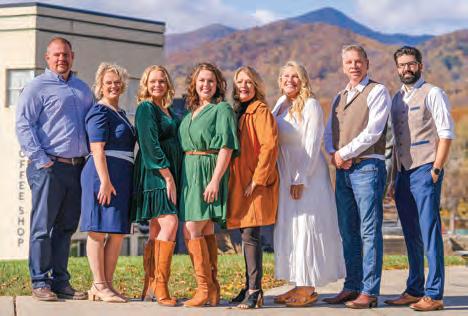











T TO EA WHAAT AT T WITH ALPHA GAL
Alpha-Gal Syndrome, also known as mammalian meat alle allergy to meat. This allergy develops after a Lone Star tick a reaction in the immune system. This condition is becomin common in the Southeast. Across the U.S. it’s estimated t 1-2% of the population has Alpha-Gal Syndrroome (AGS), bu e the Lone Star tick is mor wher re e prevalent that percentage much higherr, , and estimates are 8%-46% of the populatio areas may have AGS.
For someone with AGS they must avoid mammalian meat and also any byproducts (e.g. gelatin, broth) or else they w allergic reactions which can range from stomach pain to hi even life-threatening anaphylaxis. This means no beef, por Many with AGS also cannot consume dairy prrooducts like m cottage cheese and cheese without experiencing allergic re
ergy, is an k bite causes ng more that about ut in states e can go on in those in any form will experience ives and k, or lamb. milk, yogurt, eactions.





















ces of pr but focusing on sour rootein that can be safely eaten tostart.
n is one place
to start.
Safe sources of protein:
• Poultry (chicken, turkey, quail, emu) and eggs
• Fish and seafood
• Beans, lentils
• T Toofu, tempeh
Sources:
Geographic Distribution of Suspected Alpha-gal Syndrro o — United States, January 2017 – December 2022 | MM
Alpha-gal syndrroome - Symptoms and causes - Mayo Cli
ome Cases WR linic

Leah McGrath, RDN Ingles Market Corporate

Leah McGrath







The N.C. Department of Transportation and its partners have selected two sites in the Pigeon River Gorge for extracting and storing material to help rebuild sections of Interstate 40 damaged by Hurricane Helene.
A nearly 33-acre site will be used to extract stone, and an adjacent 11.5-acre site will be used to store overburden material, which will be used to restore the larger site once construction is complete. The sites are located in the Pisgah National Forest, just across the river near the eastern end of the I40 damage.
“The coordination between all agencies and stakeholders in the area has been tremendous and provides a great start to reconstruction of this critical corridor,” NCDOT Division 14 Engineer Wesley Grindstaff said. “This decision will have the lowest impact on the long-term health of the forest out of all the possible sites.”
The selection of these sites will reduce estimated construction costs and timelines compared to using rock materials from other locations farther away from the damaged section. Using these sites will also decrease travel times for I-40 drivers and increase safety by reducing the number of heavy trucks in the two-lane pattern.
To use stone from the nearby sites, the U.S. Department of Transportation Federal Highway Administration received a temporary transfer of the land from the owner, the USDA Forest Service. A Special Use Permit from the Forest Service enabled NCDOT to test up to seven potential extraction sites and identify the most sufficient sites for helping rebuild the interstate. FHWA then issued a temporary easement allowing NCDOT to extract stone from these sites.
“The U.S. Department of Transportation is committed to helping North Carolina rebuild, and with this site selection we are one step closer to rebuilding I-40 at lightning speed,” said Secretary Sean P. Duffy. “Thanks to our strong federal and state partnerships, we are delivering results in record time and accelerating Hurricane Helene recovery efforts. The people of western North Carolina deserve nothing less.”
The site evaluation process included a
thorough review and extensive field surveys of natural and cultural resources, avoidance and minimization efforts where feasible, site ingress and egress design refinements, and ongoing data analysis based on testing results and input from additional agencies and stakeholders.
While preparations for mineral extraction are underway, NCDOT, FHWA and the Forest Service are actively collaborating on a long-term plan to address forest restoration and wildlife habitat improvements once excavation is complete.
improve ecological resiliency through forest restoration, as well as improve game and aquatic habitats.”
Other agencies coordinating on reconstruction include the U.S. Army Corps of Engineers, U.S. Fish and Wildlife Service, N.C. Division of Water Resources and N.C. Wildlife Resources Commission.
NCDOT and its contract partners worked through the winter to stabilize 10 locations along the four-mile stretch and prepare the remaining two westbound lanes to carry one lane of traffic in each direction.
tion necessary to properly design the required retaining walls. The causeway will also allow the contractor, Ames Construction, to safely build the retaining walls without additional road or lane closures along the I-40 corridor.
Later this summer, once all permits are obtained, crews will build a temporary bridge across the river, improve a haul road and prepare the larger site for material extraction. Once crews are able to access the site, the rock removal and processing will begin for reconstructing I-40. Crews will uti-

the long-term recovery of Western North Carolina, and when looking at the time and resources needed to get this work complete, sourcing material from the Pisgah makes the most sense,” said Forest Supervisor James Melonas with the National Forests in North Carolina. “Once this critical work is complete, we will have the opportunity to

transport while functionally completing temporary construction tasks.
Crews are currently completing a causeway adjacent to the river corridor. The causeway provides critical access to the base of the interstate for geotechnical data collec-





“We are pleased that we have reached another milestone on this long path to reconstruction,” Grindstaff said. “NCDOT and our partners will continue working in the Gorge and on designs to build the best facility possible.”










































Westernmost North Carolina Sen. Kevin Corbin (R-Macon) has been named the legislator of the year by the North Carolina Community Action Association, honoring his exceptional commitment to public service, advocacy for vulnerable populations and leadership in advancing transformative legislation.
Representing Senate District 50 — which includes Cherokee, Clay, Graham, Haywood, Jackson, Macon, Swain and Transylvania Counties — Corbin has consistently demonstrated a deep understanding of the needs of rural communities in Western North Carolina, according to a press release issued by the NCCAA.
“His unwavering dedication to the people of Western North Carolina and his ability to drive meaningful, bipartisan change exemplifies what effective leadership looks like in today’s political climate,” said NCCAA Executive Director Sharon Goodson.
A lifelong public servant, Corbin began his political career at age 22 on the Macon County School Board, serving for two decades, including 16 as chair. He later served as a Macon County Commissioner, a member of the North Carolina House of Representatives and was elected to the North Carolina Senate in 2020.
Corbin was instrumental in the expansion of Medicaid in North Carolina, extending healthcare coverage to 600,000 previously uninsured residents — a landmark achievement that reflects his deep concern for the well-being of all North Carolinians, regardless of political affiliation. He has also championed the Weatherization Assistance Program, which helps improve energy efficiency, health and safety in low-income households across the state.
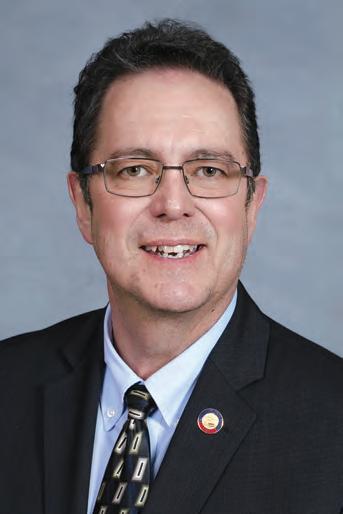
“It is an incredible honor to be named Legislator of the Year by the NC Community Action Association,” Corbin said. “I have been happy to work with organizations such as them to improve the lives of citizens in NC and especially in my district in Far Western NC. I was surprised but very thankful for the recognition.”
Outside of his public service, Corbin is a devoted family man. He and his wife Beth have two children, Matt and Maggie, and are active members of Holly Springs Baptist Church, where he serves as a deacon. He is also a founding member of the gospel vocal group Blue Ridge, exemplifying his deep community ties and love for service.
From June 27 to 29, IDEA Haywood will present the second annual “Pride on Main” celebration in Waynesville under the banner, “y’all means all.” Festivities begin Friday, June 27, at 9 p.m. with a kickoff event at the Water’n Hole Bar & Grill. On Saturday, Pride begins at 10 a.m. at the Haywood County Courthouse with opening remarks and performances by Grand Marshal Kat Williams, an Emmy-nominated singer. A parade follows at 10:30 a.m., making its way down Main Street.
From 11 a.m. to 4 p.m., a number of events will take place on Wall Street, including musical performances and a professional wrestling exhibition that, based on last year’s performance, is not to be missed. More than 60 vendors will be present.
At 6 p.m., the celebration continues with the Damn Goode Drag Show at Folkmoot.
On Sunday, June 29, the weekend closes with a Pride Service at 9 a.m., hosted by Love First at the Pigeon Community Multicultural Development Center, followed by an afternoon at the Meadowlark Motel for “Garlic Bread with the Gays at the Pool,” including Pride Pool Yoga with Axis Yoga from noon to 3 p.m.
“‘Pride on Main’ is more than a celebration — it’s an expression of resilience, joy, and love for every member of our community,” said Tera McIntosh, founder of IDEA Haywood and lead organizer of the event. “We’re proud to create a space where everyone can show up exactly as they are in their own community where they play, live, work and learn. Haywood County is for all of us.”
For event updates, venue info, a list of sponsors who made this happen, and full details, visit haywoodncprideonmain.org.




Americans are surviving not because of the system, but in spite of it
BY C ORY VAILLANCOURT P OLITICS E DITOR
Squeezed into a corner room on the ground floor of what was once a grade school in a quiet Waynesville neighborhood, a small free pantry and market provides food, clothing and household goods to some of Haywood County’s most vulnerable citizens at no cost. The pantry is one of many, rooted in compassion and community, but also in contradiction.
without billing codes, a doctor’s office without insurance cards, a clinic without co-pays. For three days beginning June 4, the arena hosted a free “mega clinic,” offering thousands of dollars’ worth of medical, dental and vision care at absolutely no cost to anyone who walks through the door.
“The main reason is because I realized that there were a lot of people, despite the wonderful health care systems that we have, there’s still a big gap and there’s a lot of people that still are missing opportunities,” said Dr. Lela Lewis, founder of the Liberty Health Alliance.
Lewis is an OB/GYN who practices in Arizona but periodically sets up the volunteer-staffed mega clinics around the country.
ity and inclusion. But the clinic’s existence also asks an uncomfortable question: Why is this necessary at all?
Organized by Lewis and the LHA, a Seventh-day Adventist-affiliated nonprofit based in Arizona, the Asheville event was part of a growing network of large-scale, volunteer-powered clinics that have quietly swept the country in recent years. Similar operations led by the same group and its president have appeared in cities like Phoenix, Tampa and Washington, D.C.
In every case, they draw thousands, and in every case, they are praised not only for the care they provide, but for exposing just how many people still go without it.
“When I started, I actually thought that we would end up treating mostly homeless people,” Lewis said. “I was very surprised, even in that very first event in Oakland and San Francisco — and it’s been the same case

Pop-up lifelines — the rise of free goods and services — were not unheard-of preHelene, but their proliferation in Western North Carolina points to a deeper crisis. They signal not abundance, but absence, serving as a quiet indictment of the systems meant to ensure no one would need them in the first place — systems that are currently under attack.
Last week, the cavernous Harrah’s Cherokee Center in downtown Asheville transformed into something most residents have never seen before — a hospital
Everything about the event seems designed to reverse the usual flow of American healthcare. There are no eligibility requirements. No referrals. No means testing. No gatekeeping. Services are offered on a first-come, first-serve basis, no questions asked.
More than 500 volunteers provided Xrays, pap smears, dental cleanings, eye exams, extractions, minor surgical procedures, massages, mental health counseling and even free glasses. Childcare was always available onsite. Plant-based meals were served. For three days, a system notorious for complexity and exclusion ran on simplic-
from the effects of Hurricane Helene. But scratch beneath the surface, and another story emerges, one of structural failure, policy neglect and the normalization of stopgap survival in place of systemic care.
“This is not a fix-all,” Lewis said. In a country with the world’s highest per capita health spending, the rise of volunteerrun mega clinics means the market isn’t working, and in Western North Carolina, like so many other places, the cracks have become gorges.
While the clinic is nominally a response to Helene, it’s clear that the need for it predates any storm. Hurricanes may damage homes, but they don’t explain the thousands of people across the state who rely on mutual aid, mobile pantries, pop-up clinics and free stores to meet the most basic human needs. This is not about disaster relief. It’s about the disaster of ordinary life in a country where insulin costs thousands each year, a dental extraction can take a month’s rent and dental care is considered a luxury.
The LHA’s last financial report shows revenues of nearly $500,000 and nary a nickel from any local, state or federal government agency. Lewis is the LHA’s only paid employee and earned $46,000 in 2023 — a fraction of what she could make if she devoted more of her time to private practice.
Events like this one are, by nature, episodic. For three days, care floods into a city like a wave, then recedes. Those lucky enough to be seen will walk away in better shape, or at the very least, with some sense of being acknowledged. The problems they face — poverty, chronic illness, a lack of stable housing or childcare — won’t vanish on the ride home.
If anything, the scale of the event serves as a referendum on what local, state and federal governments are not doing. Asheville, like much of Western North Carolina, has seen the quiet disappearance of primary care physicians, the consolidation of health systems and the continued struggle for affordable dental and vision services. Mental health beds are scarce. Preventive care is inconsistent. And while the Affordable Care Act reduced the number of uninsured residents, it did little to ensure those with coverage can actually use it without financial ruin.
Lewis said it would take a literal miracle for the clinic’s services to not be needed.
all over the country, any city I’ve ever gone to — that the vast majority of the people are the working-class poor. They may or may not have health insurance, and if they do have health insurance, the co-pays and deductibles are too high. It’s a question of, do they put food on the table or for their family or do they get the services that they need, particularly dental and vision?”
On its face, this is a story about generosity. Hundreds of licensed medical professionals and support staff from across the country donate their time and labor to treat the community —particularly those still reeling
“For Jesus to come back in the clouds and take us home,” she said. “And I don’t say that facetiously. I’m a Christian, and Jesus said ‘The poor you will always have with you.’ We live in a bad situation. Will services for those who are in need ever be no longer needed? No, not until this difficult, sinful situation is eradicated, whenever it is God decides to end this thing.”
According to a metric used by the National Institutes of Health called “vast majority income,” most Americans subsisted on an average annual income of less than $24,633 between 2019 and 2023.
Vast majority income is defined as that which is earned by the lowest-earning 80% of the population.
Only 17 of North Carolina’s F
100 counties have a VMI above the average for the country as a whole. Only 21 have a VMI above the state average of $22,835.
In Western North Carolina, only Buncombe, Henderson and Transylvania has a higher VMI than the state’s average.
Rutherford County has the lowest VMI in the west, at $17,178. Graham, Jackson, McDowell and Swain counties round out the bottom five. At $22,363, Haywood County scores just below the state average.
At the same time, so-called fair market rents published each year by the U.S. Department of Housing and Urban Development eat up most, if not all, of that income. In Haywood County, for example, a fair-market one-bedroom goes for $1,105 a month, or $13,260 a year — leaving a person who earns the VMI just $9,103 per year, or about $759 per month, for everything else. Utilities. Transportation. Clothes. Health care coverage. Food.
Given that HUD also defines people who spend more than 30% of their income on housing as “housing cost burdened,” there’s not a single county in Western North Carolina where a significant portion of the population isn’t housing cost burdened. In fact, those who spend more than 50% of their income on housing are defined as “severely burdened.”
Last fall, the U.S. Census Bureau said that nearly half of all renters are cost-burdened, with many others severely burdened.
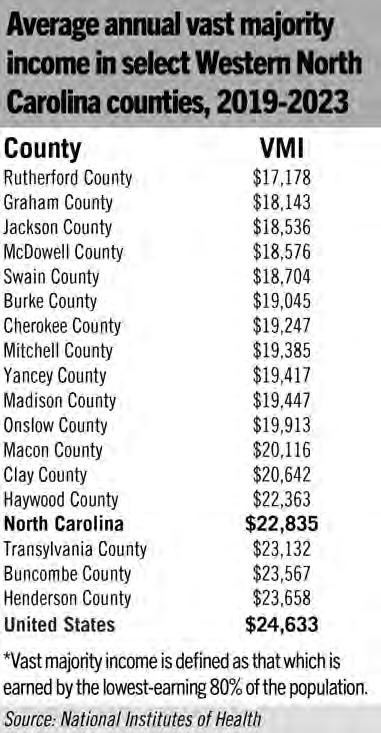
To relieve the burden for the vast majority, at least in Haywood County, a one-bedroom would have to go for less than $450 a month.
President Donald Trump’s so-called “big beautiful bill” — a sweeping package of tax cuts and spending reforms — promises relief but delivers it with a tilted scale even as his tariffs disproportionately erode purchasing power.
At its heart are permanent extensions of the 2017 Trump tax cuts, preserving the seven-tier bracket system while ensuring millionaires continue to benefit the most.
According to the Congressional Budget Office, the top 1% would receive an average tax cut of more than $48,000 annually, while middle-income households would see less than $900.
restrict eligibility and freeze provider payments, saving $793 billion, but as a result, 8.6 million people — disproportionately low-income, rural and disabled — would lose coverage over the next decade, according to the Congressional Budget Office. Estimates show that decision will affect between 300,000 and 400,000 people in North Carolina.
Despite the cuts and reforms, the bill would also add $2.4 trillion to the national debt over 10 years. On the day Trump took office in 2017, the national debt stood at $19.9 trillion. On the day that President Joe Biden took office in 2021, it stood at $27.9 trillion. On the day Trump took office again in 2025, it was $36.2 trillion.
In the name of tax relief and with no regard for debt, the bill cuts a direct line through the safety net, reinforcing what events like the mega clinic already make clear — survival is a policy choice.
Over at Church Street Studios, the former school and daycare that now serves as a community hub for wellness-centered businesses in Waynesville, that small corner room on the ground flood is packed with donated clothes, canned goods and all manner of personal hygiene items.
There are no forms to fill out. No proof of income required. No gatekeepers doling out rationed goods from behind a desk. Just open doors, open shelves, and an open invitation: take what you need.
The Little Free Queer Store, a project of the nonprofit HayCo Pride, did not begin as a disaster relief program. It was supposed to debut at a community event on Oct. 5, 2024, with free food, free haircuts, free notaries and free health care services.
But Hurricane Helene had arrived just days earlier, displacing thousands across the region and rewriting the store’s mission before it even began.
“This was always a part of the work and our mission as an organization,” said founder Chelsea White-Hoglen.
essential. Diapers. Postpartum supplies. Over-the-counter pain relievers. Tampons. Toothpaste. Things that SNAP and WIC won’t touch.
White-Hoglen, a Jackson County native with a master’s degree in social work, sees a clear trend in the 20 to 25 people who show up each week. More than half are parents. Most are in their late 20s or early 30s. A lot of them are moms, including one who’d come in earlier that day, toting a toddler.
“It’s people who look like they probably have a roof over their head, but it’s on a month-to-month basis of whether that’s going to continue to be over their head,” she said.
It is not, in other words, the stereotype of the destitute. These are the people who are supposed to be okay. The nearly-middle class. The system’s strivers, who find themselves broke at the register when their kid spikes a fever and the acetaminophen costs $11.47.
White-Hoglen has learned plenty just by watching what people reach for and how they respond. She recalled one woman who “literally started crying. She was like, ‘You guys are so nice. I go to soup kitchens and pantries in the area and I feel so shamed and judged, and I come here and like it feels like I’m here in community.’”
That sense of dignity, of refusing to separate the needy from the worthy, is foundational. The “queer” part of the store’s name is meant to signify a judgement-free zone in terms of gender identity or sexuality, but it also extends across the board.
“Any good ol’ boy with a MAGA hat could walk in here and I’d be like, ‘Take what you need,’” she said. The space itself reinforces that feeling. “We had this shelf that was essentially an all-access shelf anytime that the building was open, so even outside of our open hours, folks could access those things,”
That practice was discontinued due to a fire code violation. Traffic dipped, but word-of-mouth remains powerful. A single social media post still draws a crowd.
“It’s people who the public perception would probably call, ‘the working poor,’” White-Hoglen said.
One of the most surprising dynamics, however, has been how quickly users of the store become contributors, recycling crutches, or maternity clothes, when they’re no longer needed.
“I think whether or not they feel this way before they came in, it’s folks who now find themselves feeling like they can both give and receive, like they are a part of a like ecology or like internal economy,” she said, resisting the idea that this work is only temporary. She sees the entire model as a counterweight to American hyperindividualism.
More than that, she says, the project is a rejection of “the lies that we’ve been sold that we can work ourselves into a better life, when really, first of all, that’s something very few people can do. Sure, if all of us worked 90 to 100 hours [a week], maybe we could work our way into a better life. But at what cost?”

The bill also eliminates federal taxes on tips and overtime pay for workers earning under $160,000 but does nothing to shift the broader imbalance that favors the ultra-wealthy. Meanwhile, the cost of those tax breaks is recouped not from corporate subsidies or defense spending, but from the wallets of the poor.
The bill would impose new Medicaid work requirements,
Despite the disruption, the store now serves anyone — hurricane survivor or not — who walks through the door.
“We don’t have any eligibility requirements or screening process for, like, shoppers of the free store,” WhiteHoglen said. “We also don’t limit what people can take by quantity or item or anything like that.”
What’s inside? The overlooked, the unglamorous, the
The store exists in a broader mutual aid network, reaching from the Piedmont to Central Appalachia and indeed all across a country that spends billions on defense and doles out billions in corporate subsidies. HayCo Pride operates yearly on a budget of just $8,000. Not all of that goes to the pantry. But it’s the free clinics and the sidewalk pantries that are quietly revealing the truth — millions of Americans are surviving not because of the system, but in spite of it. The real “cost of free” is what it says about who we’ve chosen to leave behind.
“I think the forward-facing work as it appears, as direct aid, is a short-term solution,” White-Hoglen said. “Changing the dynamic — I think that is the long-term work.”
BY KYLE P ERROTTI
There are few, if any, occasions that take place in a Haywood County courtroom that are as joyous as a celebration for someone who graduates from the Adult Accountability and Recovery Court program.
Last Friday, the program honored its third and fourth graduates. Both individuals were joined by family and friends who knew too well how addiction had derailed their lives. In addition, Sheriff Bill Wilkie, County Manager Bryant Morehead and Commissioner Terry Ramey also sat in the gallery, along with various probation officers who over the years have had their fair share of interactions with the graduates.
The rest of the participants in the program sat in the jury box, speaking lightheartedly about everyday annoyances and lamenting struggles with continued judgment from those who would rather dwell on past failures than celebrate current victories.
It was clear that the individuals in the jury box, most of whom were not so long ago familiar faces in Haywood’s courtrooms and jails, are becoming favorites of those who work at the justice center. One of the first participants to enter the courtroom was greeted by the bailiff, who gleefully asked about the participant’s kids.
who spends time at the jail talking to inmates experiencing addiction, came into the courtroom and asked one of the women in the jury box how she was doing.
“I’m good,” the woman said, and after a brief pause added. “I’m sober.”
“And you’re smiling,” Cummings exclaimed. “Look at you.”
Through the recovery court program, participants have access to health care, employment and housing assistance. However, they are also subject to intense
identified by their first names only.
“I think Jennifer is probably the most changed from the beginning of this program to now,” Leslie said.
Jennifer had struggled with health problems, and as her opioid addiction worsened, so too did her relationship with her husband, who for a time left her. But through the program and with the help of other community resources, Jennifer found a way out.
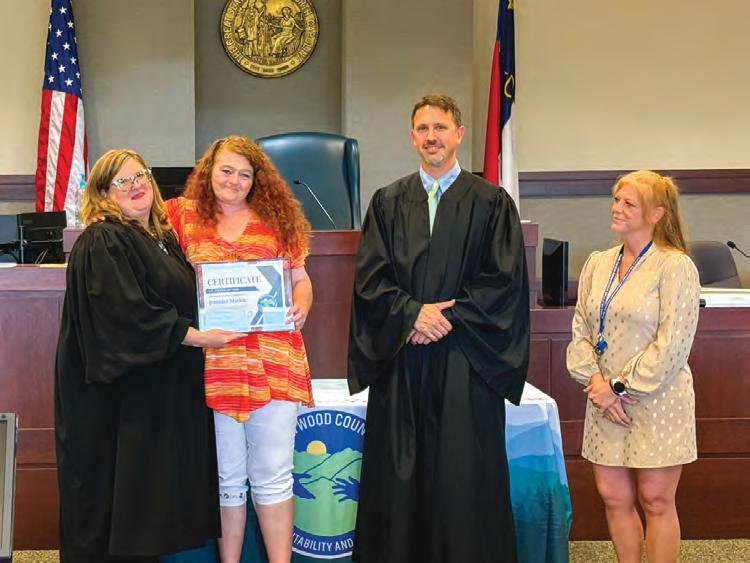
Bob Cummings, a peer support specialist


“She ended up moving to Pathways and staying there for a long period of time, and that’s where she really started rebuilding her life and going to classes … She has been strong and now she’s a huge support,” Leslie said. “She texts people, she reaches out, she makes sure that everybody’s doing okay. She’s and really encourages everybody.”
Jennifer has now been sober for 14 months and is back with her husband.
Heather’s case is a bit different. She came into the program having already begun her recovery in earnest and is now 18 months sober. Although Heather was on the right track prior to entering the program, she knew she needed something more to achieve







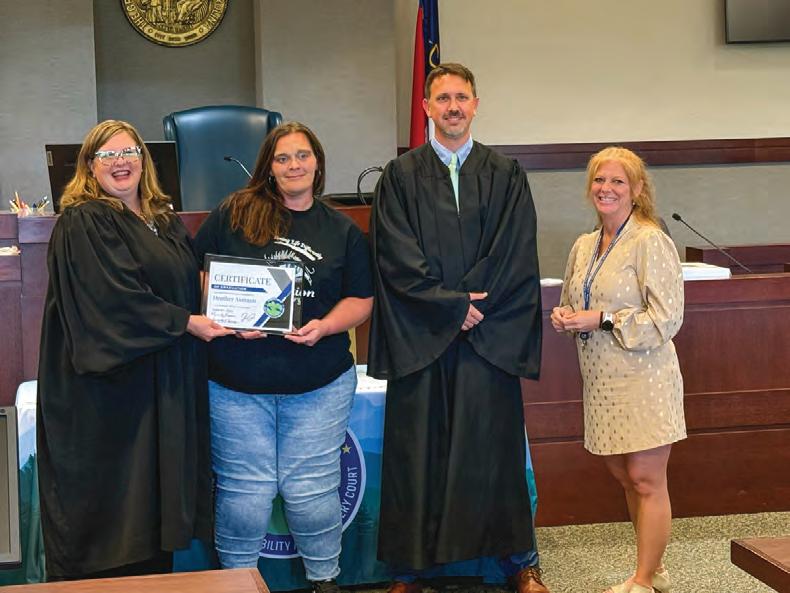
Heather was throughout the program.
“She has absolutely killed it … Heather is the hardest worker,” Leslie said.
Perhaps most exciting, Heather is healing important relationships that had been fractured by addiction.











times every week. During the early phases, they also submit to electronic monitoring. While slip-ups, including relapses, are expected, if someone isn’t committed to the program, a judge can send them back to regular court and jail becomes an immediate threat, if not an inevitability.
Amanda Seay, program coordinator, began the graduation ceremony, and discussed how important she believes the court to be because it helps individuals while restoring human capital.
“I can see the potential in every [participant], and I think they each have so much to offer,” she said.
Seay introduced District Court Judge Monica Leslie, who presides over the program’s court sessions. Leslie offered brief introductions of the graduates — Jennifer and Heather — who in this story will be
“One of my favorite things has been watching her reestablish her relationship with her teenage son,” Leslie said.
The guest speaker for the event was Samantha Bradley, a Jackson County woman who battled addiction but has enjoyed about a decade of sobriety. She talked about the starting point.
“By 14 or 15, I was using substances recreationally, and at the time, it felt like an escape, relief or even fun. But it didn’t stay that way; it Never does, does it?” she said. “My use escalated over time. What started recreational
became regular and then became necessary. I kept it hidden for a long time, but eventually, like so many others, I crossed the line into IV drug use. I chased my drug choice into places I never said I would go. I did things that I said I would never do.”
Bradley found her rock bottom when she wound up in jail, where she learned out she was pregnant with her drug dealer’s baby. She became emotional as she talked about overcoming her addiction, a process that took years and plenty of relapses.
“As always, cravings hit,” Bradley said. “I’m craving like mad, but I don’t want to be another statistic. I don’t want to be that chronic relapsing. I want to be a chronic overcomer, because I can do this right.”
Bradley said that the thing that ultimately saved her was medical assisted treatment using Suboxone, which blocks opioid cravings. While she acknowledged that such treatment may not work for everyone, she credits the medication for her long-term success in recovery.
Her ultimate message was simple yet poignant.
“The small daily practice of doing the next right thing, and then the next one, and then still doing the right thing when no was looking, it has taken me to where I am,” she said.
The final speakers were the graduates themselves. First up was Heather, who described the depths of despair her addition led her to.
“I remember walking down the road just out of the hospital after overdosing whenever I was searching for my next fix,” she said. “So, you know, just feeling that like, what if I wouldn’t wake up next time? And then just being lonely all the time. My wife, she had been sober for some time and was trying to get me to go to some kind of inpatient treatment, but I was terrified, you know what I mean?”
Heather talked about getting sober and going to meetings in Buncombe County, but the real challenge came when she returned home to Haywood, where all the people she used to use with still live. But despite her shame, guilt and fear, Heather pressed on.
“I was able to start working and being able to be a part of my son’s and parents’ life again,” she said. “Then I started seeing people I used to run with, and some of them were coming a long way, too, and that made me want to do better … Here I am a year and a half later.”
Next, Jennifer spoke. Her addiction began in 2008 when she was in a car wreck and subsequently prescribed opioids for a long-term course of opioids. She became addicted and struggled for almost two decades. Along with the program, Jennifer credited her sobriety to the support of her husband and other family members.
“I’d never be where I am today with you, and I love y’all,” she said.
The recovery court began in Haywood County as a pilot program funded by the state; however, as part of the agreement, it was understood that the county would have to provide the money to continue the program after a year of operation. Last month, county commissioners agreed to do just that, appropriating $140,000 to keep it going.
Leslie has said before that she considers presiding over recovery court to be one of the most satisfying parts of her career on the bench, and she told The Smoky Mountain News that, despite the challenges, it just keeps getting better.
“We provide one-on-one support and direction that a lot of other programs can’t provide,” Leslie said. “And we’re thrilled that the county sees the value in what we’re doing.”
Judge Justin Greene also presides over recovery court sessions. He said that just sitting there in court and listening to Jennifer and Heather tell their stories should be enough for people to realize the importance of the program — it saves lives, restores families and strengthens the community.
“You hear these stories that these folks tell, the steps that it takes to get to recovery,” Greene said. “it’s so difficult for folks to get there, and this is such a big help to get to sobriety from a point where people are just in really bad shape. It’s very necessary for the health of the individuals and the community,”


The First Presbyterian Church of Waynesville has created a coupon book offering discounts to Waynesville merchants who lost business due to the devastation caused by Hurricane Helene.
Organized by Brenda Stiles, about 25 businesses are participating. “Shop owners were excited about this idea and are hopeful that they’ll acquire new customers,” said Stiles.
The coupon books can be purchased (cash only for $15) at the church office at 305 Main St., 8:30 a.m. to 1 p.m. For questions, call 828.456.3243. The coupon books are now available. Donated

Franklin 11:00-11:45 @ Seays Farm & Garden Sylva 12:45-1:30 @ Country Road Farms Inc Lake Junaluska 2:30-3:15 @ Junaluska Feed Center
4:15-5:00 @ Tractor Supply Co. Thursday, June 26
Fletcher
@
BY C ORY VAILLANCOURT P OLITICS E DITOR
In a year when Jackson County commis-
sioners are proposing a substantial property tax hike, outside agitators are still pushing commissioners to consider a costly withdrawal from the Fontana Regional Library system that could result in an even costlier lawsuit, all over an issue that will never be resolved to everyone’s liking — the definition of “inappropriate.”





After another marathon commission meeting filled with passionate public comments that exposed sharp ideological divides and showcased the intense local and regional conversation surrounding public libraries, commissioners have now committed to one last-ditch attempt at compromise, with a June 30 deadline looming.
“I just want to let everybody know that nobody up here at these tables are trying to close any library, and nobody up here is trying to ban any books,” Jennings said with the caveat that unless something changes, he would still support leaving the FRL. His comments were also seen as an attempt to contextualize a statement made by Commissioner Jenny Hooper on May 20 that one option was “to close the library” — a comment repeatedly cited by pro-FRL speakers.
The FRL system, which also includes libraries in Macon and Swain counties, has come under increasing fire from some conservative groups claiming that children’s sections contain inappropriate materials. The regional system grants Jackson County residents access to shared materials, statewide interlibrary loans, consortium pricing for
Alan Lomax, a Jackson County resident in his 70s, said he remembered seeing a television documentary when he was 13, and that the interviewees had their faces covered to protect their identities.
“It was the first time in my life I had heard the word ‘homosexuality’ but I knew immediately that they were talking about me … it was the first time in my life that I seriously considered suicide,” Lomax said from the podium in a calm, soft voice that was belied by his trembling knees. “There was obviously a clear and definite intent at that time to erase people like myself, to make us invisible, and yes, I will use the word ‘censor’ us. No one groomed me. No one in my life had ever alluded to the fact that there was such a thing as same-sex attractions. I didn’t come out as a gay man until I was in my late 50s.”

























Commissioners moved their regular June 3 meeting to an auditorium at Southwestern Community College after their May 20 meeting generated so much interest that people had to be moved into an overflow room at the commission’s regular meeting place.
Barricades in front of the auditorium, heavy law enforcement presence, metal detectors and a nobags policy were all in place, not because of any specific threat but instead out of an abundance of caution, Sheriff Doug Farmer told The Smoky Mountain News that night.
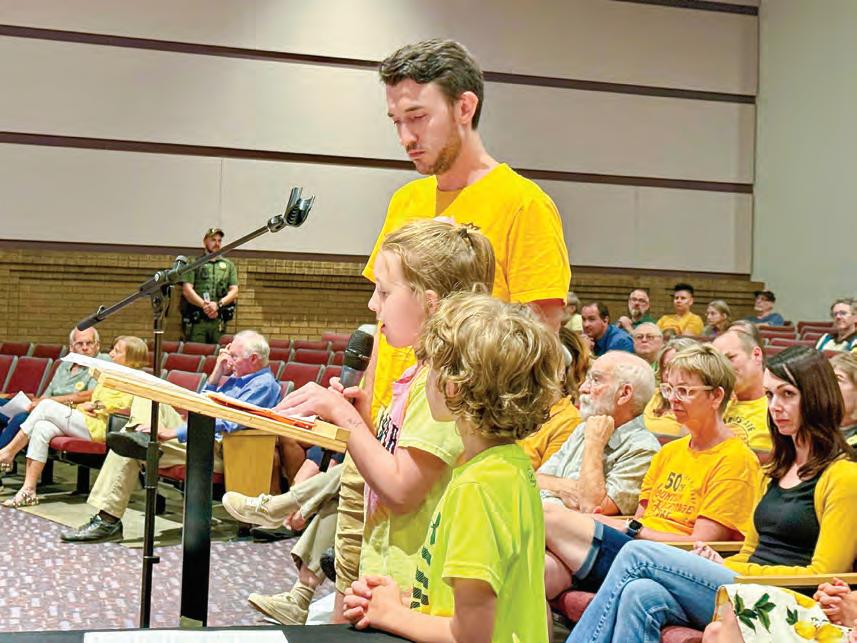
Roughly 200 people filed in, some wearing yellow in support of the library and others bearing bright red “Jexit” signs — perhaps a prophetic play on Great Britain’s disastrous 2020 “Brexit” from the European Union.










More than 50 people signed up for their allotted three minutes of public comment, but before they began, Commissioner Michael Jennings attempted to get out in front of what most expected to be another firestorm of criticism.
digital resources and a robust IT backbone funded largely by state and grant dollars. It also includes NC Cardinal membership, digital databases and shared programming initiatives that have helped FRL libraries win multiple state awards.
Over the next two hours, nearly 50 people took to the podium to opine on what, exactly, is “inappropriate.” Supporters of the library outnumbered opponents by a five-toone margin and raised concerns ranging from First Amendment violations to nannystate overreach to the insinuation that books turn kids gay.
Another profound comment came from nine-year-old Sylva resident Evelyn Craig.
“I need you to understand that I have parents who help me learn and grow. They help me pick out safe books — not an old man from Highlands,” Craig told commissioners. “If you would, look at all the people who showed up today to fight. Now, look at yourselves. You should be ashamed.”
Writer, naturalist and Jackson County resident Adam Bigelow, who brought some levity to the previous meeting by accusing commis-

sioners of treating pro-library constituents as “a bunch of crows out here, just crowing to y’all” and then proceeded to “caw” like a crow for the final 53 seconds of his allotted time, abandoned the theatrics and instead offered commissioners a few lines of ancient Israelite erotic poetry. Bigelow’s comments illustrated just how slippery the slope is, First Amendment notwithstanding.
“How fair and pleasant you are, delectable maiden! You are stately as a palm tree, and your breasts are like its clusters [of dates]. I say I will climb the palm tree and lay hold of its branches. Oh, may your breasts be like clusters of the vine and the scent of your breath like apples and your kisses like the best wine that goes down smoothly, gliding of lips and teeth,” Bigelow read from his phone. “Now, I haven’t read this book, but it’s there [in the library] and it’s got a lot more racy things in it. I believe y’all call it the Bible.”
Austin Frady, pastor of Old Savannah Baptist Church, said he was speaking on behalf of his congregation in defense of religious perspectives in public settings.
“We respect the First Amendment of our Constitution. Our public library in Jackson County should be a place where information is made available, but ideology is not promoted,” Frady said. “At the same time, we observe a pattern of programming and displays for certain perspectives — especially of those tied to non-traditional gender or sexual identity themes — receive disproportionate attention compared to more traditional and faithbased viewpoints.”
“By pushing an ideology upon our children through certain materials, they have no place in the library,” he said.
Deborah Stanley, one of only seven speakers to oppose the library, rightly pointed out that Jackson County’s conservative voters had elected the commissioners, and that she expected them to follow their wishes.
from other counties and states to tell us what to do with our library.”
But that’s exactly what’s been happening.
A10-year interlocal agreement signed less than a year ago reaffirmed Jackson County’s membership in FRL. In the agreement, two relevant clauses suggest a sharp, sudden change of heart on the part of some Jackson County Commissioners since that time.

Opponents of the Fontana Regional Library system brought bright red signs bearing just one word — “Jexit,” a portmanteau of “Jackson” and “exit” that plays upon Great Britain’s 2020 “Brexit” from the European Union. Cory Vaillancourt photo
Jackson County resident Matthew Nations, a youth pastor, decried what he called FRL’s implicit backing of an agenda aimed at the county’s youngest residents.
“If we voters of Jackson County wanted liberal ideologies, we would have voted for the liberals. We did not vote for the liberals. We voted for you,” Stanley said. “Please don’t vote as RINOs, ‘Republicans In Name Only.’ We do not need people
“WHEREAS, the Boards of County Commissioners of Jackson, Macon, and Swain Counties recognize that collaboration provides the most effective and efficient means to provide public library service to the residents of said counties … and WHEREAS, this collaboration provides opportunities for service and resource allocations otherwise beyond the financial and service capacities of the individual county governments and libraries …” the agreement reads.
Public records obtained by The Smoky Mountain News shows dozens of emails sent to commissioners urging withdrawal from the FRL system came from just a few residents of Macon County, where the same group of crusaders unsuccessfully tried to spark Macon commissioners to withdraw from the FRL system a more than a year ago. That spark was extinguished by the 2024 interlocal agreement.
Among the most prominent sparklers was Jim Gaston, who also showed up to speak at the June 3 Jackson County meeting. Gaston, not a resident of Jackson County, told Jackson County commissioners exactly what to do with their library, criticizing the use of pronouns by staff, the presence of tampons in men’s restrooms and what he called an “unaccountable” DEI agenda, warning that such inclusivity practices were driving libraries toward partisanship and that his concerns were shared by residents F
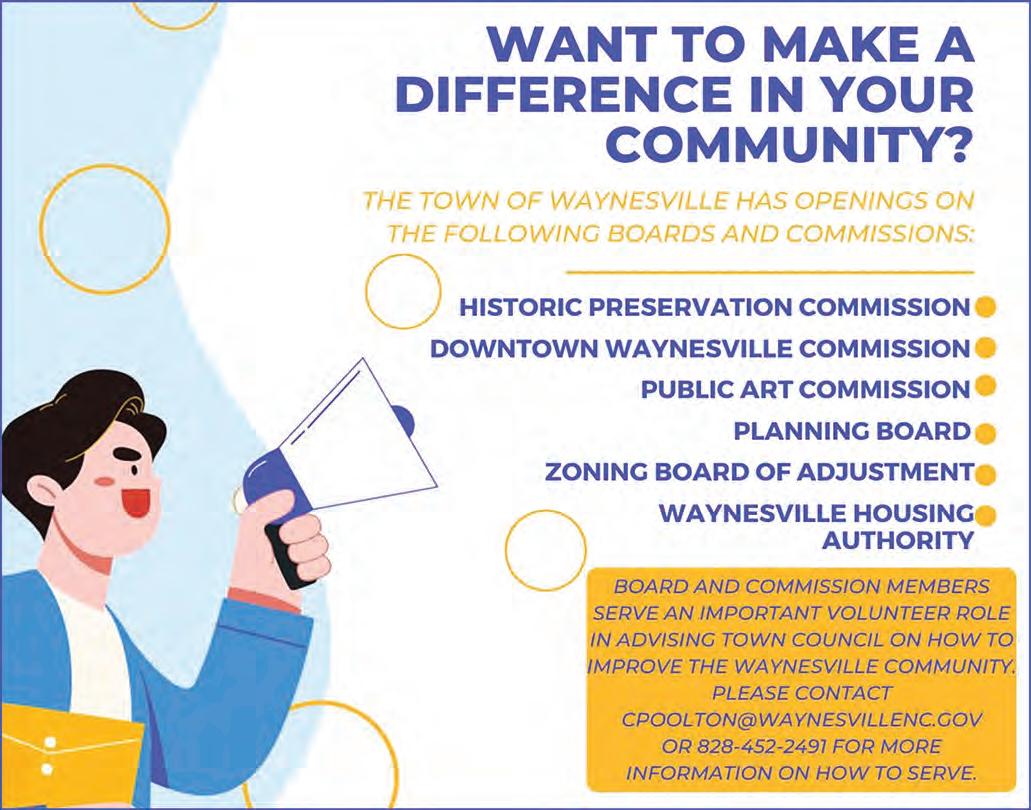





across all three counties.
According to a leaked email first reported by The Smoky Mountain News in February, Gaston urged the unidentified recipient to keep the FRL withdrawal process covert and to avoid making the issue about ideology.
“Exiting the FRL must be justified as economic reasons. Less blowback and leftist drama,” Gaston wrote. “It’s all about the financials.”
In this instance Gaston may be right, but maybe not in the way he intended.
According to the analysis, replicating these services alone would cost hundreds of thousands of dollars upfront, with ongoing costs for maintenance, support, updates and staffing.
Equipment and software provided or maintained by FRL includes computers, printers, copiers, scanners, wi-fi and internet hardware. King estimates $289,000 in initial costs just to replace hardware and network infrastructure if the county severs ties with FRL.
FRL also handles key staffing and train-



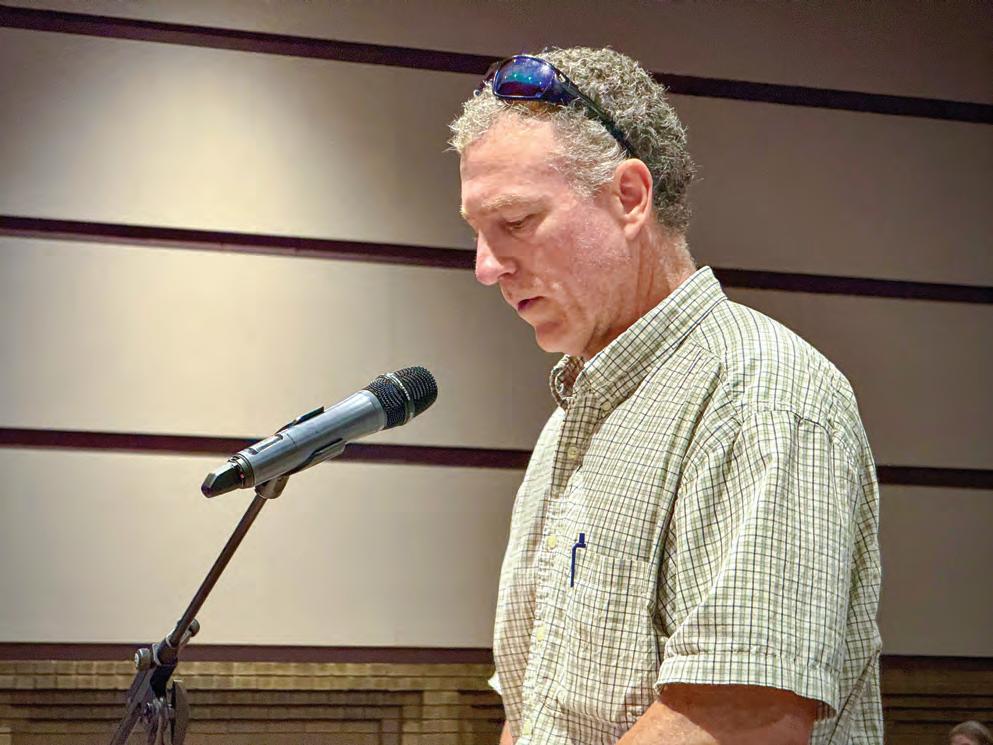
Documents provided by Jackson County Manager Kevin King show that if Jackson County withdraws from the FRL system, the county would incur substantial, immediate and ongoing costs to recreate essential library infrastructure and services currently provided at regional or state-subsidized rates.
If current levels of service are maintained, the choice to withdraw from the FRL and for the first time in at least 81 years go it alone in the library business would lead to the growth of county bureaucracy and its annual budget.
FRL currently provides all core IT and operational infrastructure for Jackson County’s libraries, including integrated library software, circulation databases, statewide courier services, website hosting, content management, cybersecurity systems, cataloging, processing and acquisition.
To replace all that, Jackson County would need to develop or purchase a full library management system independently.
ing functions, including IT support, cataloging, programming coordination and continuing education. Jackson County would need to hire and train new personnel, or contract services at market rates. That’s estimated to increase annual personnel costs by at least $150,000.
Membership in FRL also enables access to bulk pricing, state or federal grants and statewide interlibrary loan programs, such as NC Cardinal. Leaving the system would eliminate Jackson’s eligibility for these benefits, reducing resource availability and increasing acquisition costs. Shared digital subscriptions alone would cost an additional $30,000–$50,000 annually.
The total projected increase to Jackson County’s yearly library budget if it withdraws from FRL is at least $500,000, not including capital investments or one-time transition costs approaching or exceeding $300,000.











In any given year, it is certainly within the purview of commissioners to determine spending priorities and make annual appropriations in support thereof; this, however, this is not just any given year.
A recent countywide property revaluation has resulted in a substantial increase in the value of taxable property in Jackson County. Tax Collector Tracy Ashe said that value has grown by about 60%. What that means is, at the current property tax rate, the county would generate about 60% more revenue; however, that’s not what local governments usually do with revaluation windfalls, which can be unsustainable for property owners.
Instead, they usually go revenue-neutral, which means lowering the tax rate to compensate for the additional value and ending up with essentially the same amount of revenue as the previous year. Or, they lower the tax rate to not-quite-revenue-neutral, retaining a small revenue increase to pay for the never-ending needs local governments see each year, like pay increases for first respon-
the 2026-27 budget is passed sometime next summer — right before commissioners Todd Bryson and John Smith, along with Chairman Mark Letson, face reelection.
By that time, the situation could be much different. After a 2023 Pride display at the Yancey County library angered some, a concerted “Hide the Pride” campaign began, according to reporting in The Assembly by Jessica Wakeman. Visitors to the library hid LGBT books on shelves so they couldn’t be found, or checked out LGBT titles and never returned them, preventing others from accessing them.
Like in Jackson County, Yancey County has been part of a regional library system with two other counties, called AMY — Avery, Mitchell, Yancey. In the summer of 2024, Yancey commissioners waited until the library director was out of town, called a special meeting and voted unanimously to leave the AMY system without taking any public comment.
Angered by the decision, some Yancey County residents vowed to sue, and may be making good on that promise.
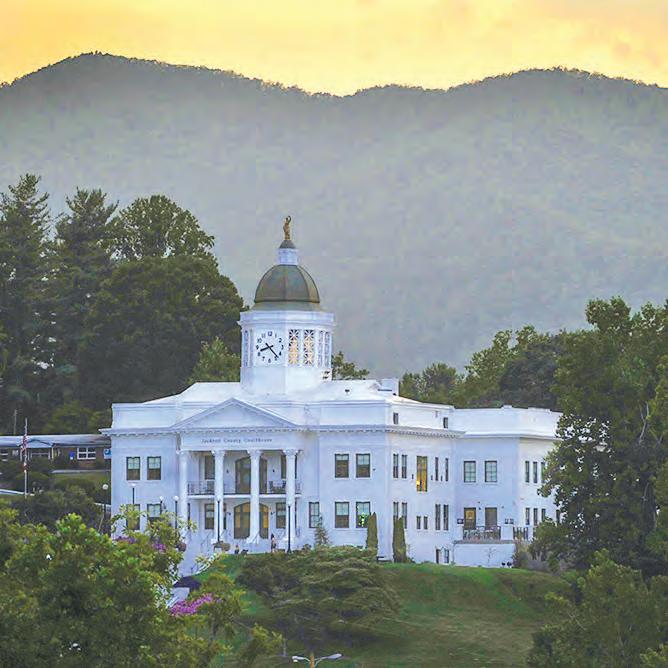
The current property tax rate is 38 cents per $100 in assessed value. The revenue neutral rate is 26.91 cents. The proposed budget for the 2025-26 fiscal year was presented with a rate of 32 cents. If approved, the 32cent rate would contribute to a $107 million general fund budget, up 14% from the current year’s $93.8 million budget.
Withdrawing from the FRL takes an entire year, so the proposed budget doesn’t include the projected increase in library expenses. Commissioners wouldn’t be on the hook for any of the projected costs until

try to prevent our county commissioners from wresting control of the library for political purposes. In the process, we hope to set a legal precedent that will protect libraries all across North Carolina.”
Mirroring the financial projections in Jackson County, the website states that the decision to withdraw from AMY will result in reduced services for more money — approximately $100,000.
The website specifically mentions the sit-



uation in Jackson County.
“We’re fighting not just for our library but for Fontana, other regional libraries in North Carolina and beyond,” it says.
ACLU are suing the Rutherford County School Board to reverse the banning of over 145 books, claiming viewpoint discrimination.
In Minnesota, educators and students have sued the St. Francis school district over similar bans.
If current levels of service are maintained, the choice to withdraw from the FRL and for the first time in at least 81 years go it alone in the library business would lead to the growth of county bureaucracy and its annual budget.
As of press time on June 10, a GoFundMe for legal fees had raised more than $42,000 toward a $100,000 goal, including some donations topping $2,000. The website says that’s enough to get the process rolling, but two people at the Brooks Pierce law firm told SMN they had no knowledge of any potential suit, and the organizer, Landon Beaver, didn’t return inquiries from SMN about what he’d done with the money.
The Yancey lawsuit, if it’s real, isn’t the only action on this front. Across the United States, a wave of lawsuits is challenging the removal or restriction of books in libraries and schools, many of them targeting LGBTQ content, racial themes or materials deemed “sexually explicit.”
In Idaho, a coalition of publishers and library advocates is suing the state over House Bill 710, arguing the law is overly vague and violates free speech protections by criminalizing access to certain materials for minors.
In South Carolina, the ACLU is representing patrons of the Greenville County Library System in a federal lawsuit over the removal of dozens of LGBTQ-affirming books, alleging systemic discrimination and censorship.
In Tennessee, PEN America and the
The North Carolina State Bureau of Investigation SBI, in partnership with the Henderson County Drug Interdiction and Criminal Enforcement unit, concluded “Operation Uptown Funk,” a year-long investigation into an alleged local Drug Trafficking Organization.
Over the course of the investigation, detectives and agents gathered evidence, investigated numerous overdoses and dedicated countless hours to building a comprehensive case. Their work resulted in the seizure of trafficking-level quantities of methamphetamine, cocaine and
In Iowa, a federal judge temporarily blocked a new law banning any depictions of sex acts in school books, pending further constitutional review.
Even military-connected schools haven’t escaped scrutiny. Families have filed suit against the Department of Defense Education Activity (DoDEA) over the removal of hundreds of titles touching on race, gender and sexuality.
House Bill 636, currently making its way through the North Carolina General Assembly, is titled “Promoting wholesome content for students” and passed its first reading in the Senate on April 16. The bill states that “Library media is not appropriate for the age, grade level, intellectual development and ability level for any age or age group of children if it includes descriptions or visual depictions of sexual activity or is pervasively vulgar.”
Arguably, the passages read by Bigelow could qualify the book he found them in to be removed from public libraries across the state.
Of all the speakers during the 130minute public comment session, only one — Ron Robinson — called for
fentanyl, along with firearms.
Agencies that participated in the investigation were the DEA; SBI; sheriff’s offices in Buncombe, Henderson, Haywood and Transylvania counties; and the Asheville and Hendersonville police departments.

In total, over 30 individuals have been charged with a range of offenses related to drug trafficking, firearms violations and conspiracy.
Operation Uptown Funk has resulted in the seizure of the following items:
• $177,437 of United States currency
• More than 7.5 pounds of suspected crack/cocaine
• More than 8 pounds of suspected methamphetamine
• More than a pound of suspected fentanyl
• More than 14 pounds of marijuana
• 20 firearms
compromise.
“One of the things that I would like to do is think about bringing both groups together, representatives from both groups, to talk about this and come to some kind of an agreement that meets the needs of both” Robinson said. “Some people think that compromise is losing things. There are also ways in my work where you can bring things together and meet the needs of both. And that would be nice if we could do that here.”
After the public comments concluded, commissioners engaged in a brief work session where King presented the financial implications of a withdrawal.
Letson then proposed setting up a joint meeting between commissioners and the FRL board, which was received with a smattering of applause from those who had remained in the audience.
Commissioner John Smith said.
“I do think we have to be willing to compromise and negotiate as well,” Letson said, again earning polite applause. “I mean, that’s kind of the whole point. If we can find that compromise, I think we’ll be in better shape as a county.”
“Some people think that compromise is losing things. There are also ways in my work where you can bring things together and meet the needs of both. And that would be nice if we could do that here.”
Ron Robinson
The last regular meeting of the Jackson County Board of Commissioners before the June 30 withdrawal deadline is scheduled for June 17, but commissioners set the joint meeting with the FRL board for 5:30 p.m. on June 19 at the Justice and Administration building, located at 401 Grindstaff Cove Road in Sylva. That means it’s unlikely that commissioners will take action on June 17, and that if after meeting with FRL commissioners still want to withdraw from FRL, they’d have to call a special meeting with 48 hours advance notice.
“I think that’s what negotiation looks like,” said Commissioner Todd Bryson. “But, they’ve got to be willing to negotiate, willing to compromise.”
“So far they haven’t been,”

If after meeting with FRL Jackson County commissioners decide not to diminish library services and raise property taxes by withdrawing, they need do nothing at all — except honor the agreement they signed last year.


















As Mountain Projects celebrates its 60th anniversary serving Haywood and Jackson Counties, the organization is marking a
Despite these efforts, demand is growing — over 500 families remain on the Section 8 housing waitlist, and 75 seniors are
For the comfort and safety of all shoppers, no dogs are allowed at the flea market except for official service animals.
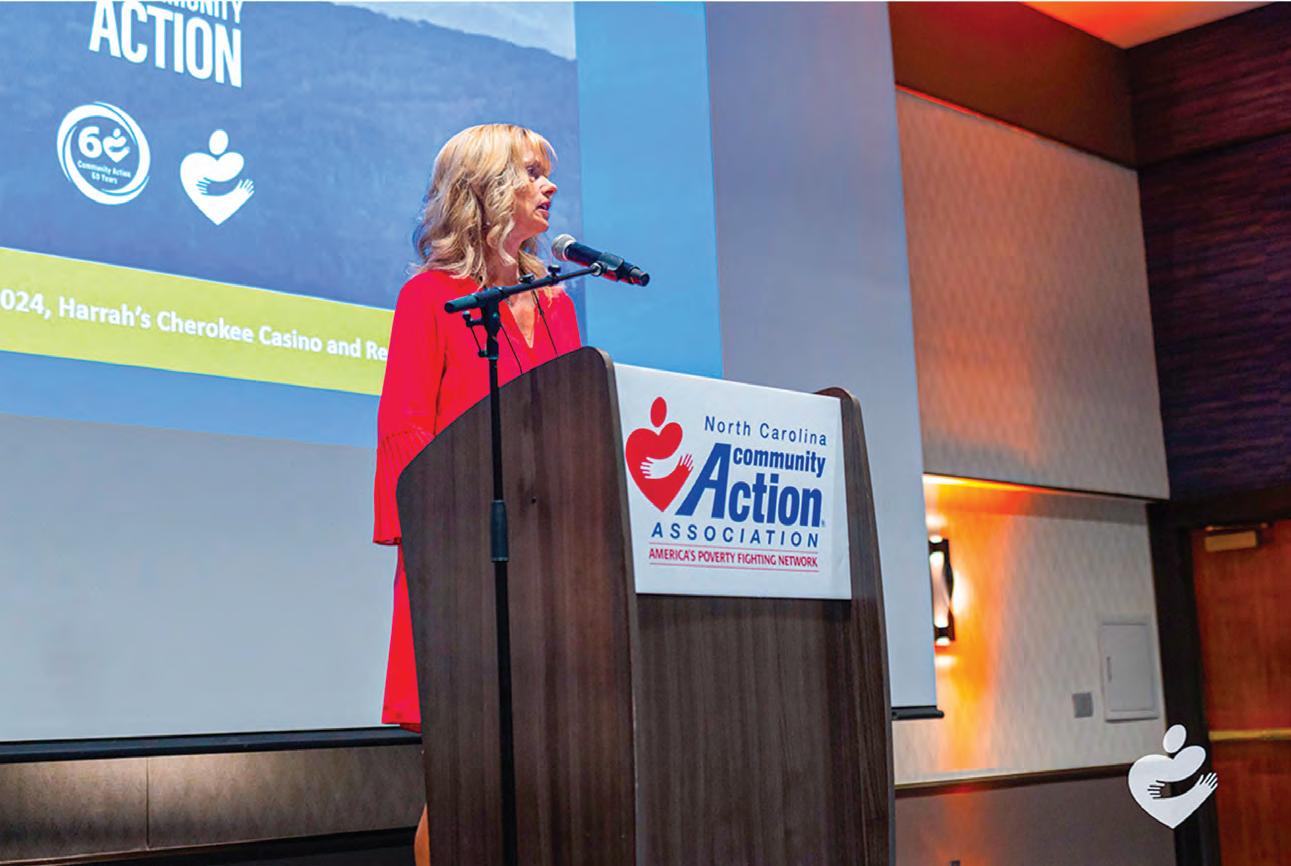

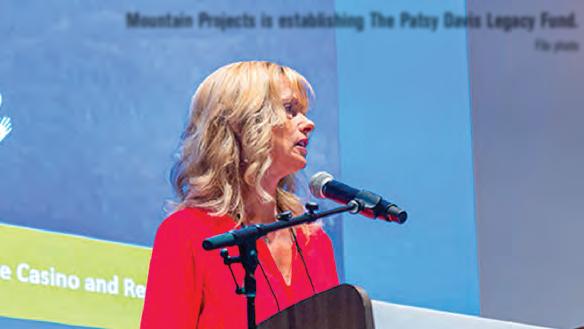
tural traditions and history of Southern Appalachia.
Annually presented by the chancellor of Western Carolina University, recipients will be honored during the Mountain Heritage Days festival in a public ceremony which will be held at 3:30 p.m. on Saturday, Sept. 27, at Western Carolina University’s Bardo Arts Center. Award winners will receive an engraved commemorative plaque.
Honorees are selected by a committee made up of community and WCU representatives. The two award categories recognize an individual and an organization for distinguished service, accomplishments, influence or expertise in maintaining the cultural viability of the region.
Nominations must be emailed to mhd@wcu.edu with the subject line “Award Nomination” by Monday, July 7, at 5 p.m.
Nominations should be no more than five pages in length and must outline the nominee’s

Days, will span an entire week, Sept. 22-27, and will feature newly added programming such as evening faculty-led lectures with hands-on involvement, heritage demonstrators on the plaza, and a Friday night concert at Bridge Park in Sylva.
For more information about the history of the festival and the awards, visit mhd.wcu.edu
The Jackson County Republican Party monthly meeting will be held at 6 p.m. Thursday, June 19, in the Harold’s Supermarket plaza. The party is hosting a town board candidate forum. All candidates interested in running for the Sylva Town Board are invited to attend the meeting. There are three seats available, including mayor.
This year’s event will feature several antiques and solid wood doors, in addition to plants, linens, books, tools, yard equipment, furniture, holiday decorations, small electrical appliances, kitchenware, toys, a ladies’ boutique, games, sporting and camping goods, homemade baked goods and more.
The flea market is hosted by The Junaluskans, a volunteer organization of Lake Junaluska Assembly made up of people who love Lake Junaluska. The annual flea market is The Junaluskans’ largest fundraising event of the year. Proceeds from the flea market support many projects, including maintenance of Lake Junaluska gardens such as the Rose Walk, Corneille Bryan Native Garden, Biblical Garden and Inspiration Point; the Swan Feeding Program; the Community Chorus; Christmas decorations at the lake; Lake Junaluska cleanup programs; sponsorship of Clothes to Kids; and the monthly book review program.
The Folkmoot Friendship Center Campus will host the Smoky Mountain Yoga & Wellness Festival from 10 a.m. to 9 p.m. Saturday, June 21, at the
King is now a yoga instructor at Axis Studio, a certified immersive meditation leader and the founder of Smoky Mountain Yoga & Wellness
The event kicks off with a free, dynamic opening ceremony at 10 a.m. outdoors “on the green,” the former sports field adjacent to the Folkmoot Campus, with lively music, movement and breathwork.
The first 25 yogis to set up their mats will receive a complimentary mocktail drink ticket for the Roll Up Herbal Bar, set up in Queen Auditorium all day.
Movement classes and wellness workshops will continue throughout the day both outside and in the Queen Auditorium, the Axis Studio and conference rooms inside the Friendship Center.
The event will culminate at 7 p.m. with a closing ceremony led by Jake Gilmore, Christy Tagye and the Axis Ensemble with motivational words, music and movement and a 7:51p.m., summer
The event will be held rain or shine.
In recognition of National Safety Month, Harris Regional Hospital will host a Lunch & Learn focused on children’s summer safety from 11:30 a.m. to 12:30 p.m. on June 24 in the Easton Board Room at Harris Regional Hospital.
The event will be led by Dr. Carmen Nations of Harris Pediatrics, who will share expert guidance on how to keep children safe during the summer months. Topics will include water safety, sun protection, preventing heat-related illnesses, playground and bike safety and travel precautions — offering families practical advice to reduce seasonal risks and promote overall well-being.
“Our commitment to the community goes beyond hospital walls,” said Ashley Hindman, CEO of Harris Regional Hospital. “Through programs like this Lunch & Learn, we’re equipping families with the knowledge they need to keep their children safe and healthy all summer long.”
Whether you’re a parent, grandparent, teacher or community member, this session is a great opportunity to learn essential safety tips and ask questions in a welcoming, informative setting.
Lunch will be provided.
To register, contact Lilly Ferguson at 770.776.7291 or lillian.ferguson@lifepointhealth.net.
My office is cool and our building on Montgomery Street in Waynesville is quiet. Almost everyone who works at The Smoky Mountain News has gone home for a few minutes to tend to kids, dogs, wives and husbands as it’s one hour before the annual first Friday in June birthday bash celebrating another year of putting out this weekly print newspaper (and now a seven-day-per-week news website).
Another trip around the sun for the earth, another year in the books for The Smoky Mountain News. Our very first edition hit the streets on June 6, 1999, which was 26 years ago this week.
This local news company’s entire lifespan has occurred in a transformative and transitional era for journalism, not just in America but around the world. In September 1998, the year prior to our opening, Google was founded. That search platform and its ease of use helped spur the initial transition to online news offerings. Three years earlier, 1996, the venerable New York Times created its first website, posting some of its stories on what then was referred to as the “World Wide Web.” It was a very rudimentary site, but it spoke to the future. And so here we are today, still providing coverage of events and issues that are important to the people of this region. Almost 100,000 unique visitors read something on our website each month. We print around 16,000 print papers each week, distributing them all over the four-county region
To the Editor:
I would like to speak in support of a decision from this board to remove from a library system that continues to make decisions that offer and highlight sexually based material, including sexually explicit material, for children. It would behoove this board to find an alternative option of having a library. No child needs to be exposed to adult themes, sexual themes or explicit material. I stand here today as a local pastor, expressing not only my opinions, but the opinions of many others in the community.
I want to clarify my position, a position, I should note, that is also held by a large number of citizens but is often misrepresented by the media, including local sources. This is not about LGBT material. This is not about the LGBT community. This is about the immoral and, in my opinion, illegal decisions to provide sexually themed and illicit material to minors.
I also oppose material being made available to children that confuses and contradicts basic biology and gender. The reason for this is simple:
Absolute truth does exist. “Two” plus “two” does in fact equal “four,” no questions asked. The answer does not change because one day a person wakes up and decides to say that the answer is now “five” because it makes them feel better. “Two” plus “two” equals “four” and that is how it should be taught to children. Therefore, if we seek to teach our children absolute truth, it needs to
that makes up our coverage area (Haywood, Jackson, Macon and Swain counties, along with the Qualla Boundary).
But the number of independent, locally owned news entities keeps shrinking, and there are no locally owned daily newspapers in this state. Local media means the owners are not beholden to billionaires or faraway shareholders; no, we are beholden to you, our local readers, the folks who decide whether we survive to see another day, another edition, another birthday to celebrate next June.

In our region, the locally owned group includes us, The Mountaineer, the Sylva Herald and the Highlands Newspaper. All the others in this far west region are owned by corporations not located in the community they serve (save for a couple over in Asheville). The Cherokee One Feather and its editor Robert Jumper do a great job. It is tribally owned and so isn’t completely independent.
But it’s not just the media landscape that has changed so drastically over the last 26 years. In this short time, our online habits and the ease of access it provides to almost all necessities have made us all dependent on far-away faceless companies that have re-shaped nearly every transactional decision
be in all areas. In the area of gender, the absolute truth of human biology is that there are males and females, and what you are is determined long before you are aware of it and no matter what you say or do, that truth will never change.
If I suddenly declared that I was a 91-yearold man, rather than a 31-year-old man, that does not change the simple fact that I am 31, not 91. And if everyone around me just accepted that I was 91 and changed their reality to fit within my distorted reality, they would not be showing me love or help. They would be ignoring whatever issue I had that made me think this inaccurate reality, and they would possibly be enabling more destructive tendencies as I continued to live out this false reality.
So it is with our children. To somehow say that holding to the absolute truth, that we are born either male or female, is hateful and wrong is disingenuous. In contrast, letting a child become confused or more confused by much of what these books contain, rather than helping them to understand the absolute truth, is wrong and destructive. I know that some disagree with what I am saying and will often ask, “Why not leave us alone? If you don’t want it for your kid, then ignore it, but let us have access to it.” My answer to these folks is simple:
We are a society, not in a vacuum. I am a citizen of the same country, state, and community as you, therefore, I have a right to express how I want that society to operate, and I refuse to be a part of a society that is OK with confusing children about simple truths
we make. If you wanted, you could have food, clothes and home care necessities dropped at your doorstep. One can get car and house loans and insurance online. All of us could wrap ourselves in a cocoon of digital outreach and severely reduce interactions with other humans and what I will refer to as the real world.
And now, the AI revolution is launching as we speak. It can write stories, write computer code, write music and poetry, create household budgets, create paintings and … who knows what else in the very near future. Will we all have implants that give us the ability to do all manner to once impossible intellectual feats?
Remember the Luddites? They were English textile workers in the early industrial age who wrecked factories and protested when mechanization started doing the weaving and other work once performed by real people. The term has now come to refer to anyone who spurns technological advances in favor of the old ways of doing things.
Well, I’m no Luddite, but I do still enjoy some of the old things, including a newspaper and a good cup of coffee. I also enjoy a good birthday party, and ours was fantastic. Thanks to all of you who helped us mark one more year covering the news in Western North Carolina. We sincerely appreciate you.
(Scott McLeod can be reached at info@smokymountainnews.com.)
and exposing them to sexual themes. And I will not leave this society because this is where I have chosen to live, therefore my only option is to fight. I will fight for the truth. I will fight for what is right. I will fight for the innocence of children. I will fight. And I will not stop, I will not yield, I will not back down.
Dylan Castle Pastor of Home Fellowships, Jackson and Macon counties
To The Editor:
Do you believe that our country deserves better than this current administration? Do you feel fearful, angry, hopeless or powerless at times? Do you wish there was something you could do to bring about positive change? Then come join your voices with ours on Saturday, June 14 at noon at the Haywood County Historic Courthouse for “Hands Off Haywood — No Kings Rally.”
We are your community neighbors. We are proud American citizens exercising our right to speak out freely, respectfully and peacefully. There will be speakers telling how things happening in D.C. affect us here. There will be signs and chants, reminding us what makes our country great and we don’t want to lose. There will be new friends for you to meet. There will also be a voter registration table.
We welcome all to this non-partisan peaceful rally for our country.
Mary
Ford, Major, USAF (retired) Waynesville
To the Editor:
Most of us now understand that Project 2025, brainstorm of the ideologues at the Heritage Foundation and barely mentioned a year or so ago, is very real and that — right now — our federal government is being radically restructured in accordance with that 900-plus page manifesto as it seeks to consolidate power in the executive branch; to consolidate power to the will or whim of the president. In order to do so, it must weaken or eliminate the checks and balances of the remaining two branches. As well, it will eliminate or weaken the independent, non-partisan governmental agencies, such as the FDIC, FDA, FAA, etc., that serve as common sense civil protections for every American. Beginning with the mass purging of federal civil servants, Project 2025 barrels on, reined in only by the intervention of our courts which are themselves now in danger of being weakened to the point of ineffectiveness. But Project 2025 doesn’t just seek to reinterpret and restructure the whole of the federal government. It also seeks to influence each sovereign, individual citizen’s personal life journey. It’s sharply focused (as the authoritarian mind so often is) on matters of sexuality and lifestyle. It would legitimize only its own narrow view of marriage and would reward compliance with that view with tax advantages and preferential treatment in matters of, for example, adoption and foster care. Project 2025 also contains language that classifies alternative sexu-
al and gender identity as pornographic and goes even further to suggest that library books for children that so much as allude to sexuality whatsoever would be banned and ideally “librarians and other purveyors” of such materials be jailed and/or forced to register as sex offenders! Punishment is central to authoritarian thinking.
Not long ago, J.D. Vance, protege of the Heritage Foundation, was stridently advocating for a bounce in the nation’s birthrate, admonishing American women for choosing careers before motherhood, even stating outright that he knew what was best for our country’s diverse, sophisticated females; that to bear children for the State was their true source of happiness. And their duty. That did not go over well. But Project 2025 calls for just that.
Project 2025 and the politicians that find authoritarianism personally satisfying have ideas about what is right and proper for all of us, regardless of our individuality, regardless of what we each strive for in our God-given lives.
Examine this trend closely before our next election. We the people still have the power of our vote. For now.
Mase Lucas Scaly Mountain
To The Editor:
My friends who are Donald Trump supporters have been claiming that President Trump has kept all his promises, that’s why they still support him. However, other than closing the border and deporting thousands of people — even if they’re here legally and even if it involves disappearing people off the streets illegally, he has delivered none of his important promises.
Here’s a partial list:
• Reduce inflation day one
• End the war Russia started against Ukraine
• End the war in Gaza
• Save $2 trillion in federal spending
• Lower gas price to under $2 per gallon What he has done instead has made inflation and the wars worse. The death toll in Gaza is over 50,000 and Israel plans to “empty out” the northern half of the country. If that’s not ethnic cleansing, I don’t know what is. Trump apparently plans to build a resort there. Trump has been totally played by Putin who has helped Trump get elected twice. Now the war in Ukraine — let's be clear, unlawfully started by Russia in 2022 — is worse than ever. Putin was encouraged in this when Trump paused aid to Ukraine in March of this year. Now Putin has no intention of stopping the war — likely until Russia reabsorbs Ukraine into its sphere of influence with fake elections and puppet leaders, continuing the rebuilding of the Soviet Union. The Trump-Musk alliance, unprece-
dented in that an unelected person was for months the most powerful man in the country, has cut a small slice of government spending — about $31 billion and estimated could reach $62 billion — about 0.5% of what he said he would cut. This was done partially by ending USAID which is now resulting in the deaths of hundreds of people per day due to starvation and AIDS.
To “save” this half percent of government spending besides deaths overseas of disease and starvation, Musk’s DOGE has hollowed out NOAA and FEMA. Remember Hurricane Helene? When the storm was just a tropical depression over the coast of Yucatan, the National Weather Service predicted with amazing accuracy the path the storm would take, the strength it would reach, where landfall would be and how the storm would wind up stalling over the Carolinas, Tennessee and Kentucky, dropping a Biblical deluge of water on this part of the mid-southern states.
They have also hollowed out, and essentially destroyed NIH by cancelling (illegally) contracts that were signed and firing government workers and withholding contracted money. They have reduced as many as 80,000 jobs from the Veterans Administration, 20,000 jobs from Health and Human Services, and 7,000 jobs — or 12% — from Social Security Administration. This after promising not to “touch” Social Security and of course promising to support veterans.
The adverse effects of these changes will take months and years to roll out. Poorer storm prediction, accuracy, preparedness and response will likely show how bad an idea that was by this fall. The cuts to Social Security are immediately impressive as retirees cannot reach a “real” person at the offices. The cuts to NIH and HHS will take years to have an impact as cancer and other health research has basically halted.
What is the point of these cuts that save a few paltry billions out of the $3-4 trillion annual budget? Low-income earners might save $90 to $110 per year. But Elon stands to save something like $5 million per year. Low-income earners will feel the brunt of the SSA, VA, and Medicaid cuts, while Elon and his type will not.
And in spite of these cuts — according to the Wall Street Journal on April 11 — spending under Trump is up by $154 billion compared to the same period under Biden, totally eclipsing the “savings” DOGE has claimed. Look it up.
Allan Zacher Lake Junaluska
To The Editor: Ashley Babbit! Remember that name. The Trump administration Department of Justice just awarded her
family $5 million in a wrongful death suit. This shows how corrupt this administration really is and how it caters to those with loyalty to Donald Trump rather than loyalty to our country.
Babbit was killed by gunshot wound on the Jan. 6 attempt to invade the Capitol building and overthrow the peaceful transfer of power by election. She carried a backpack as she jumped through the glass broken out of the window at the side of the door leading into the House of Representatives chamber. The door was manned and fortified by those security officers that were there to protect the Capitol and the Congress. She was a mere 50 feet from the House Chamber while a number of elected House members were still in that room, not having been evacuated to safety yet, and depending on the protection of those who were authorized to protect the Capitol. Fifty feet! That is about the length of a moderate house. She carried a backpack that could have been a suicide bomb or may have concealed multiple weapons. This was not a case of an overzealous officer. She was part of a crowd that had already proven violent action against the defending police and were chanting “Hang Mike Pence”. It was the last measured act by the legal protectors of Congress to stop the threat they perceived to the legislature of the United States.
Under the law, an individual can defend himself/herself if there is perceived threat of grave bodily harm or death. The person initiating the attack is considered the antagonist and the perpetrator of the incident. If a person attacks me with the intent to possibly kill me, and I believe this to be so, I have the right to protect myself (and my family) from immediate danger, including the use of deadly force if necessary. That is all that the officer that shot Ashley Babbit was doing. He was protecting the members of the House of Representatives that were still in the chamber, as was his job to do. Had Babbit not died, she could, and probably would have been charged with criminal acts over her actions on that day.
This action by the DOJ to award her family $5 million in damages shows just how corrupt and twisted the current administration has become. President Trump pardoned those who were convicted of the crimes they committed on that Jan. 6, thereby rewarding those that showed more loyalty to him than to the country. Ashley Babbit is no martyr. When she broke into the Capitol and jumped through that window, she was a criminal, an insurrectionist and a terrorist. There should be no tears shed for her. The people of this country need to understand how truly and blatantly corrupt and authoritarian the current administration has become. Remember that the next time that you vote.
Luther Jones
Sylva
To the Editor:
On May 22, the House of Representatives voted to pass a budget bill (The One Big Beautiful Bill) that drastically cuts America’s clean energy tax credits. Make no mistake: these cuts will hurt North Carolina and the Town of Waynesville if they become law. Experts say that these changes will raise energy costs for our households, increase pollution in Western North Carolina, and threaten the growing economic investments we’ve seen in our state. The Town of Waynesville stands to lose up to $500,000 in federal incentives that would help pay for energy upgrades for town facilities. These savings for the town taxpayers will be gone unless the tax credits are preserved.
Federal tax credits — designed to boost clean energy manufacturing across America — have been working for us. Since the passage of the Inflation Reduction Act (IRA) in 2022, our state has benefited from $24 billion in investments and the creation of 20,000 jobs. And that is just the beginning. An analysis by American Clean Power, in a report supported by the U.S. Chamber of Commerce, estimates that continuing clean energy incentives will add $103 billion in investment and 350,000 jobs in North Carolina over the next 10 years. This brings real money and real livelihoods to us all. But that success story could unravel quickly. The legislation is now in the Senate’s hands, and the House passage has set them on a path towards approving these drastic cuts. The cuts will deal a terrible blow to economic growth in N.C. and lead to a great loss of potential jobs.
If the cuts become law, energy prices will rise. Rolling back these tax credits means North Carolina (including Town of Waynesville} electricity users will face prices that are 15-20% higher in the coming years. Manufacturing will slow. Phasing out tax credits that support clean energy manufacturing will jeopardize long-term projects like battery plants, solar panel plants, and vehicle manufacturing facilities. Eliminating clean vehicle tax credits could put up to 100% of planned EV plant construction and a significant portion of existing capacity at risk, according to industry analysists.
Waynesville households and local businesses will take a huge hit. A rollback of tax credits for home energy upgrades like rooftop solar, heat pumps, water heaters, insulation, and windows is a blow to residents who’ve been using these tools to cut energy bills. Incentives have made it easier for homeowners to install solar panels and heating and cooling devices that save money and even help stabilize America’s power grid. But those benefits — and the local businesses that depend on them — are in jeopardy if Congress moves forward with these cuts.
Encouragingly, a growing number of Republican members of Congress are supporting the clean energy tax credits. Four Republican Senators, including N.C. Sen. Thom Tillis, recently sent a letter saying repeal would “lead to significant disruptions for the American people and weaken our position as a global energy leader.”
The numbers are clear: clean energy tax credits are working for N.C. and for the Town of Waynesville. Undoing them now — as the House just voted to do — would be reckless and harmful. I urge North Carolina Sen. Thom Tillis and Ted Budd to work with their colleagues in the Senate to protect these tax credits. Chuck Dickson Mayor Pro-tem Town of Waynesville
BY C ORY VAILLANCOURT
P OLITICS E DITOR
Next week, award-winning graphic novelist Andrew Aydin will return to Haywood County to help kick off an ambitious new creative endeavor — one that aims not only to elevate overlooked Appalachian voices but also to preserve the stories of Hurricane Helene’s survivors in a way that’s never been done before.
On June 17, the Pigeon Community Multicultural Development Center in Waynesville will host the official launch of the Appalachia Comics Project and the debut of its first major initiative — a Kickstarter campaign to fund the graphic novel anthology “Islands in the Sky: The Story of Helene Through Those Who Survived.”
The event will feature a lineup of regional comic creators, art previews, exclusive giveaways and a fundraising push to cover production costs. Signed memorabilia and one-on-one opportunities with creators will be available to attendees, including rare items like signed first editions of “March” autographed by the late Congressman John Lewis.
about, read and consume stories about Appalachia.”
The anthology’s focus on Helene survivors adds a layer of urgency and emotional weight.
Hurricane Helene, a deadly and destructive storm, upended lives across the region and exposed deep systemic vulnerabilities.
already in progress. A commissioned piece from Rutland, previewed during the event, will become part of the “Islands in the Sky” anthology and may be offered as a limited edition print for supporters.
“These are also people who’ve been doing the work of telling the story of Appalachia for
deeply rooted in his own past. Raised by a single mother often struggling to make ends meet, Aydin said it was a comic book purchased at a Piggly Wiggly in Hendersonville that first offered him a glimpse of a wider world — and a future in storytelling.
“’March’ was written for that nine-yearold that I once was, that needed hope and inspiration and a path forward,” he said. “I want other kids to have that. And I don’t want the world that they are given to experience just to be what they dream up in New York or Los Angeles. You should be seeing worlds that are dreamed up by people who live nearby.”

Tickets for the event will be available for purchase at the door, with proceeds going toward project expenses. A portion of the proceeds will benefit the Pigeon Center. All attendees will receive a limited-edition preview copy of the Monster Appreciation Society, a forthcoming comic.
“I believe in this so deeply that these precious items to me that I’ve held on to for years, like copies of March that the congressman signed — I gotta put myself out there,” Aydin said. “If I’m asking people to support not just with their money but with their time and their creative efforts, I gotta put a little extra of myself and my own history and my own work into making sure that this is a success.”
Aydin, best known as co-author of the “March” trilogy alongside Lewis and artist Nate Powell, has long emphasized the power of graphic storytelling to educate, inspire and spark dialogue. With “Islands in the Sky,” he hopes to do the same for Appalachia — a region he says has been consistently ignored or caricaturized by mainstream outlets.
“For too long, Appalachia has been overlooked in popular media,” he said. “There is a real need, as well as an appetite, to hear

“For too long, Appalachia has been overlooked in popular media. There is a real need, as well as an appetite, to hear about, read and consume stories about Appalachia.”
— Andrew Aydin
At its core, Aydin says the Appalachian Comics Project is about self-representation. “Sometimes if you’re not given a seat at the table, you gotta bring your own chair,” he said. “Everybody who lives in Appalachia is a storyteller. And it’s long past time that we made a sustained effort to bring those stories to the national stage.”
The June 17 launch event begins at 6 p.m. at the Pigeon Center in Waynesville. For more information or to support the project, visit appalachiacomics.org.
“Islands in the Sky” aims to preserve the firsthand accounts of those who endured it — not with dry reportage or official statements, but with raw, authentic storytelling in illustrated form.
That’s why the June 17 event serves as both a creative showcase and a critical fundraiser. Once enough money is raised, the team plans to expand the scope of the project, bringing in more voices and ensuring the contributors — including storm survivors — are compensated fairly.
The evening will feature appearances by artists and writers with deep ties to the region, including Jared Rutland, whose upcoming graphic novel on Asheville is
many years and should be recognized and be given a platform,” Aydin said. “Sometimes we don’t get a chance to see them face to face.”
Aydin said he vividly recalls how formative it was to meet creators in his youth, a memory brought full circle years later when he found himself tabling next to one of his childhood heroes, the late Peter David — a revered sci-fi and comic book author.
“If you give me a room full of eight-yearolds, that’s a tough crowd, but I love it,” he said, recalling an earlier visit to the Pigeon Center. “Because that feeling of both fear and optimism … it’s just tattooed on my brain, and I carry it with me in everything I do.”
His emotional connection to the project is
New York Times bestselling author and recipient of the National Book Award Andrew Aydin will host a Kickstarter kickoff to benefit the forthcoming “Islands in the Sky” graphic novel anthology about Hurricane Helene survivors in Western North Carolina. Admission is $20 or free to those who have already pledged to the Kickstarter campaign.
Time: 6 p.m.
Date: Tuesday, June 17
Location: Pigeon Center Multicultural Development Center, 450 Pigeon St, Waynesville.

BY GARRET K. WOODWARD
The empty washer at my local laundromat.

‘Dear lord, do right by me, you know I’m tired of being lonesome, ornery and mean’
It happened to me, again. Somebody stole my laundry. All of it. And it wasn’t even in the dryer yet. They ran out the door of my neighborhood laundromat in downtown Waynesville with two loads of wet clothes, never to be seen from or worn out and about one more time.
This is the second time in the 13 years I’ve lived in Western North Carolina that this has happened to me. It was the better part of a decade ago when it first occurred, and in the same laundromat. I swore it wouldn’t ever happen again. But, here we are, eh? To note, the washer was broken in my apartment building, which is why and how I found myself back at that particular establishment.
That old saying, “Fool me once, shame on you. Fool me twice, shame on me,” echoed loudly through my mind as I stood in front of the empty washing machine. For a split second, I thought, “Maybe some nice person put my stuff in the dryer for me.” Nope. And yet, my eternal optimism for humanity (in general) remains intact, even with this.
I took inventory of what was taken. All of my prized band T-shirts (many of which will never be replaced). My favorite jeans (which they don’t make nowadays). My underwear and socks (who steals that stuff?). And, most importantly, pretty much every piece of my expensive running clothes (which I’ve spent years purchasing and cultivating).
Why? Heck, if you need some clothes, I’ll give you the shirt off my back. But, to swipe all of my stuff? Ugh. The incident in question took place Saturday afternoon. In that moment, it also dawned on me that I now had no jeans or cool T-shirts to wear that night. How is a single, gainfully employed man supposed to wander the dating pool with confidence and the appropriate modern-day aesthetic now? I kid.
For good measure, I went through every washer and dryer. No sign of my attire. I even peered into the trash cans and walked outside and around the facility to check and see if any of my laundry ended up in the bushes or dumpster. You never now, the suspect in question may not be as huge of a Shooter Jennings fan as I am. Damn, I miss that shirt, which was purchased in Monterey, California, in 2022 when I was covering a festival (featuring
Jennings) for Rolling Stone.
And the running clothes. Not the running clothes, dude. For someone like myself who literally runs every single day (I have a running streak going back to Dec. 31, 2015) and relies on Dri-Fit technology to keep me comfortable in the heat and humidity of the South (and of constant assignments on the road), where my “Damn Yankee” blood is seemingly too thick for the summer weather here, those clothes keep me sane.
Thus, I was back to square one, as far as clothing goes. So, now what? Well, luckily, I had a couple pairs of old boxers and t-shirts to get through the weekend until I could go to the Asheville outlet mall and replace my things.
That, and the absolute generosity of several of you out there donating some much-needed funds to my running clothes fund. To note, replacing hundreds (and hundreds) of dollars of that stuff is hard on us folk trying to make a living in realm of the written word (and live modestly).
By Monday afternoon, I found myself parking at my most favorite place in the world (huge sarcasm and eye-roll on my end) — the mall. As a minimalist and someone who gets morally uncomfortable when confronted with massive consumerism and overpriced items for mass consumption, I get a ting of anxiety upon entering the mall.
Two hours later, I emerged from the mall with a few bags of clothes. I was able to replenish my running shorts and shirts. I purchased a couple T-shirts. And I was able to get some fresh boxers and socks, too. With balance somewhat returning to my daily, existential existence, I headed home and began putting everything away in my dresser.
To that, in the last few days, I’ve had some of my favorite bands give/send me T-shirts. A couple have been via snail mail, with one of you incredible readers even sending me a highlycoveted Rolling Stones tour shirt (my all-time favorite rock band, so thank you very much).
One of my most beloved rock acts, Larkin Poe, who sold out The Orange Peel in Asheville last Sunday, also handed me a T-shirt.
After the show, LP lead singer Rebecca Lovell walks up to me, gives me a big hug, and goes: “Garret, so good to see you. Heard about
1
Elizabeth and Quintin Ellison will share their poetry and photography book created with the late George Ellison, “Land of Blue Shadows: Mountain Life in Verse & View,” at 3 p.m. Saturday, June 14, at City Lights Bookstore in Sylva.
2
The 26th annual Taste of Scotland Festival will be held June 13-15 at a variety of locations around Franklin.
3
The annual “Concerts on the Creek” music series will feature TLQ+2 at 7 p.m. Friday, June 13, at Bridge Park in downtown Sylva.
4
The Marianna Black Library “Summer Music Series” will kick things off with The Ghost Peppers dulcimer duo at 7 p.m. Thursday, June 12, at the library in Bryson City.
5
A special production of “Next to Normal” will hit the stage at 7:30 p.m. June 12-14 and 2 p.m. June 15 at the Haywood Arts Regional Theatre in Waynesville.
the laundry. Sorry, dude.” We had a fine chuckle with that. She then gives me a shirt. As did opener Tyler Ramsey and the Peel, too. Much love and sincere thanks to the kindness and camaraderie I’ve always known and found in the music industry.
So, here I sit at the brand-new Laundry Plus in West Waynesville (next to Ingles). It’s Wednesday afternoon and I’m writing this here column at the counter in the lounge area. State of the art machines. Onsite service and security. Wi-Fi. And mountain views. Sold. After this week of replacing all my stolen clothes, it’s nice to have a spot where I can work and do laundry at the same time. Onward.
Currently, there’s some Waylon Jennings blasting into my headphones as I type away, specifically one of my most cherished tunes, “Lonesome, On’ry and Mean.” I can look up from time to time and see my clothes slowly getting dry. Round-n-round in the machine across the way. A sense of peace. A sense of knowing I have clothes to wear later today when I go for a sweaty jog, when I go to dinner this evening.
And to whoever stole my clothes? I hope you take a deep dive into the music of Shooter Jennings, Duane Betts, The Asheville Mountain Boys, and so forth. Those aren’t just T-shirts, it’s proud advertising for hardworking bands and great music. I also hope you take up jogging and truly understand the ways and means of the universe in doing so.
I also hope that whoever is reading this, that you find humor in what I’ve shared with you today. For humor in everyday life is the only way the world goes ‘round (at least in my book), as with having compassion towards others (known and unknown), and knowing well that the only thing you can control in life is how you react in a given situation.
Life is beautiful, grasp for it, y’all.











• Blue Ridge Beer Hub (Waynesville) will host Paul Koptak (singer-songwriter) June 14 and Doug & Lisa June 21. All shows begin at 5 p.m. Free and open to the public. 828.246.9320 / blueridgebeerhub.com.
• Boojum Brewing (Waynesville) will host “Karaoke Night” 9 p.m. Wednesdays, “Trivia” 7 p.m. Thursdays, “Open Jam” 10 p.m. Thursdays, DJ Dominion June 13, Cloud Circuit (rock/ambient) June 14 and DJ Burr June 20. All shows are located in The Gem downstairs taproom and begin at 9 p.m. unless otherwise noted. Free and open to the public. 828.246.0350 / boojumbrewing.com.
• Bryson City Brewing (Bryson City) will host Second Chance June 14 and Electric Circus June 21. All shows begin at 7 p.m. Free and open to the public. 828.538.0085 / brysoncitybrewing.com.
• Cataloochee Ranch (Maggie Valley) will host A. Lee Edwards (Americana/indie-folk) June 11, Brian Ashley Jones & Melanie Jean (Americana) 10 a.m. and 2 p.m. June 15, Marc & Anita Pruett (Americana/bluegrass) June 18 and A. Lee Edwards (Americana/ indie-folk) June 25. All shows begin at 5 p.m. unless otherwise noted. For tickets and reservations, visit cataloocheeranch.com/ranchevents/live-music.
• Classic Wineseller (Waynesville) will host Ron Lee (Frank Sinatra/Rat Pack tribute) 7:15 p.m. June 21. Dinner and live music is $70 per person (includes tax and gratuity). Reservations required. 828.452.6000 /classicwineseller.com.

TLQ+2 will play Sylva June 13. File photo
Hailing from the depths of Western North Carolina, Upstream Rebellion is rooted in the intricate musical traditions of the Blue Ridge and Great Smoky mountain ranges. The ensemble showcases a captivating blend of bluegrass standards and original numbers.
General admission is $25 per person, with $15 and $5 “pay what you can” options available. Donations are welcome. Doors open at 6 p.m. The 6 Pigs BBQ food truck will also be onsite.
For more information and/or to purchase tickets, visit folkmoot.org. To learn more about Upstream Rebellion, you can search the band’s name on Facebook and “Upstream.Rebellion” on Instagram.
The Town of Sylva, Jackson County Parks and Recreation Department and Jackson County Chamber of Commerce are proud to present the 16th season of the annual “Concerts on the Creek” music series.
TLQ+2 will hit the stage at 7 p.m. Friday, June 13, at Bridge Park in downtown Sylva.
The group features Terri Lynn Queen, Scott Baker and Kevin Jamison, who together “play a wide-ranging repertoire gathered from years of performing music.”
“Concerts on the Creek” are held every Friday night from Memorial Day through Labor Day. Everyone is encouraged to bring a chair or blanket. These events are free, with donations encouraged. Dogs must be on a leash. No smoking, vaping, coolers or tents are allowed. Bring a chair or blanket. There will be food trucks on select nights.
For more information, call the chamber at 828.586.2155, visit mountainlovers.com/concerts-onthe-creek or go to the “Concerts on the Creek” Facebook page.

• Farm At Old Edwards (Highlands) will host the “Orchard Sessions” with Andrew Wooten (singer-songwriter) June 11 and Tennessee Bluegrass Band (Americana/bluegrass) July 16. All shows begin at 6 p.m. Admission is $50 per person, with discounts rates available for hotel guests and members. 866.526.8008 / oldedwardshospitality.com/orchard-sessions.
• Friday Night Live Concert Series (Highlands) will host Southern Highland Band June 13 and Curtis Blackwell & Dixie Bluegrass Boys (Americana/bluegrass) June 20. All shows begin at 6 p.m. Free and open to the public. highlandschamber.org.
• Frog Level Brewing (Waynesville) will host “Jazz On The Level” 5:30 p.m. Tuesdays, Tyler Deaver (singer-songwriter) June 13, Rich Manz Trio (acoustic/oldies) June 14, Dustin Newcomb (singer-songwriter) 3 p.m. June 15, Kevin Dolan & Paul Koptak June 18 All shows begin at 6 p.m. unless otherwise noted. Free and open to the public. 828.454.5664 / froglevelbrewing.com.
• Frog Quarters (Franklin) will host live music from 11 a.m. to 1 p.m. Saturdays, featuring Jim Corbett (acoustic/oldies) June 14 and Paul & Kay Garfinkel with Al Scortino (Americana/ folk) June 21. Free and open to the public.
828.369.8488 / littletennessee.org.
• Harrah’s Cherokee Casino Resort (Cherokee) will host Wynonna Judd (country) 7:30 p.m. June 14. For tickets, visit caesars.com/harrahs-cherokee.
• High Country Wine & Provisions (Highlands) will host Zorki (singer-songwriter) June 13 and David Crisp (singer-songwriter) June 27. Both shows begin at 5 p.m. Free and open to the public. 828.482.4502 / highcountrywineandprovisions.com.
• Highlander Mountain House (Highlands) will host “Blues & Brews” 6-9 p.m. Thursdays ($5 cover), Zorki (singer-songwriter) 1-3 p.m. Saturdays, “Bluegrass Brunch” 10 a.m. to 1:30 p.m. Sundays (free) and the “Salon Series” with Fancy Hagood (singer-songwriter) 8:30 p.m. June 27 (tickets are $39.19 per person, tax included). 828.526.2590 / highlandermountainhouse.com.
• Hudson Library (Scaly Mountain) will host “Books & Bluegrass” from 6-9 p.m. June 19. Live music by the Foxfire Boys. Tickets are $75 per person, which includes food, drinks, music and fellowship. All proceeds go to
needed improvements at the library. 828.526.3031 / fontanalib.org/highlands.
• Innovation Brewing (Sylva) will host “Monday Night Trivia” every week, “Open Mic with Phil” on Wednesdays, Dillon Campbell (singer-songwriter) June 14 and Shane Davis (singer-songwriter) June 21. All shows and events begin at 7 p.m. unless otherwise noted. Free and open to the public. 828.586.9678/ innovation-brewing.com.
• John C. Campbell Folk School (Brasstown) will host a “Community Jam” 7 p.m. Thursdays (at the nearby Crown Restaurant) and semi-regular live music throughout the week on its campus. folkschool.org.
• Junction Pub (Sylva) will host “Open Jam” 7 p.m. Sundays, “Open Mic” 6 p.m. Thursdays and semi-regular live music on the weekends. All events begin at 8 p.m. unless otherwise noted. Free and open to the public. 828.370.2090 / facebook.com/jctpub.
• Lazy Hiker Brewing (Franklin) will host The V8s (oldies/rock) June 13, “Lazy Hiker 10th Anniversary Party” noon to 10 p.m. June 14 (live music/food trucks), Jamie Saylor
(Americana) June 20 and Roscoe’s Road Show (Americana/Cajun) June 21. All shows begin at 7 p.m. unless otherwise noted. Free and open to the public. 828.349.2337 / lazyhikerbrewing.com.
• Lazy Hiker Brewing (Sylva) will host “Music Bingo” 6:30 p.m. Mondays, Bryan & Al (soft rock/pop) June 13 and Grizzly Mammoth (rock/jam) June 20. All shows begin at 8 p.m. Free and open to the public unless otherwise noted. 828.349.2337 / lazyhikerbrewing.com.
• Macon County Public Library (Franklin) will host The Vagabonds (Americana) at 2 p.m. the first and third Monday and a “Song Circle” open jam from 3-6 p.m. the first Tuesday each month. Free and open to the public. 828.524.3600 or fontanalib.org/franklin.
• Marianna Black Library (Bryson City) will host a “Community Jam” from 6-7:30 p.m. each first and third Thursday of the month, The Ghost Peppers (Americana/folk) 7 p.m. June 12 and Liz Petty (Americana/folk) 7 p.m. June 26. Free and open to the public. 828.488.3030 / fontanalib.org/brysoncity.
• Nantahala Outdoor Center will host River Pickin’ 5 p.m. June 13, Mike Hollon 2 p.m. June 14, The Log Noggins 5 p.m. June 14, Christina Chandler 5 p.m. June 15, Ryan B. Jazz Trio 5 p.m. June 20, Brown Mountain Lightning Bugs 3 p.m. June 21, Beer & Loathing 5 p.m. June 21 and Blue (blues) 2 p.m. June 22. Free and open to the public. 828.785.5082 / noc.com.
• Old Edwards Inn (Highlands) will host live music in the Hummingbird Lounge at 5:30 p.m. every Friday and Saturday. Free and open to the public. 866.526.8008 / oldedwardshospitality.com.
• Otto Community Center (Otto) will host James Thompson (Americana) 5 p.m. June 20. Bring a beverage and snack of your choice. Free and open to the public. 770.335.0967 / go2ottonc.com.
• Peacock Performing Arts Center will host The Fine Colombians (Steely Dan tribute) June 14. All shows begin at 7:30 p.m. For tickets, 828.389.ARTS / thepeacocknc.org.

• Pickin’ On The Square (Franklin) will host Jason Passmore (country/rock) June 14 and Tugalo Holler (bluegrass) June 28. All shows begin at 6 p.m. at the Gazebo in downtown. Free and open to the public. franklinnc.com/pickin-on-the-square.html.
• Quirky Birds Treehouse & Bistro (Dillsboro) will host Open Mic Night at 7 p.m. Tuesdays and semi-regular live music on the weekends. Free and open to the public. 828.586.1717 / facebook.com/quirkybirdstreehouse.
• Rathskeller Coffee Haus & Pub (Franklin) will host “Karaoke” 7 p.m. Wednesdays, “Trivia Night” 6:30 p.m. Thursdays and “Open Mic” 6:30 p.m. Fridays. Free and open to the public. 828.369.6796 / facebook.com/rathskellercoffeebarandpub.
• Salty Dog’s Seafood & Grill (Maggie Valley) will host “Karaoke with Russell” every Monday, Daniel Pounds June 13, Long Way Ramblers June 14 and Susie Copeland (singer-songwriter) June 20. All shows begin at 7 p.m. Free and open to the public. 828.926.9105 / facebook.com/saltydogs2005.
• Santé Wine Bar (Sylva) will host semi-regular live music on Sundays. All shows begin at 5 p.m. Free and open to the public. 828.631.3075 / facebook.com/thewinebarandcellar.
• Saturdays On Pine Concert Series (Highlands) will host Boogitherapi June 14 and Spalding McIntosh & The Lionhearts June 21. All shows begin at 6 p.m. Free and open to the public. highlandschamber.org.
• Sauced (Waynesville) will host semi-regular live music on the weekends. Free and open to the public. 828.246.9585 / saucedwnc.com.
• Scotsman (Waynesville) will host Raphael
Following in the footsteps of Doc Watson, Norman Blake, Clarence White and Tony Rice, Granny’s Mason Jar brings together the talents of Jared “Blue” Smith (The Blue Revue, Bluegrass Lumber Company) and Aaron Plantenberg (Commonfolk, Big House Radio) to continue the tradition of flatpicking, travis picking and other traditional acoustic guitar styles.
Free and open to the public. For more information, call 828.538.0115 or visit mountainlayersbrewingcompany.com.
The Marianna Black Library “Summer Music Series” will kick things off with The Ghost Peppers at 7 p.m. Thursday, June 12, at the library in Bryson City. Featuring traditional dulcimer players Lois Hornbostel and Ehukai Teves, the husband/wife duo performs Appalachian music and original songs, including one song they wrote is about the town of Judson in Swain County.
Hornbostel is nationally recognized for her accomplishments in playing and teaching the Appalachian mountain dulcimer, an instrument that was first played in the mountains since the early 1800s. She has written dulcimer books for Mel Bay Publications and has organized weeks for dulcimer players at Appalachian State University, Western Carolina University and Warren Wilson College.
Hornbostel first came to Swain County in 1984, working for the Mountain Arts Program. She brought 30 student dulcimers into our local schools and taught our children for a week to play the dulcimer, making lasting friends with them.
Teves has lived in Bryson City for 12 years. He is an award-winning songwriter, who was born in Hawaii into a musical family. From his early years, he has played many instruments and performed. He fell in love with the dulcimer in Hawaii, when he was completing a B.A. degree in Vocal Performance & Music Theory.
The event is free and open to the public. For more information, call 828.488.3030 or visit fontanalib.org/brysoncity.
Graves Duo (alt-country) June 12, Rene Russell (Americana) June 19 and TrancEnd (rock/pop) 9 p.m. June 21. All shows begin at 8 p.m. unless otherwise noted. Free and open to the public. 828.246.6292 / scotsmanpublic.com.
• Slanted Window Tasting Station (Franklin) will host Madison Owenby (singer-songwriter) 6 p.m. June 13, “Music Bingo” 2 p.m. June 14, Tim Austin (singer-songwriter) 4 p.m. June 15 and Seth & Sara (Americana) 6 p.m. June 20. 828.276.9463 / slantedwindow.com.
• Smoky Mountain Dog Bar (Waynesville) will host “Open Mic Night” 5-7 p.m. Fridays. Free and open to the public. 828.246.0726 /
Concert Series” with Remedy 58 (blues/soul) June 12 and Melissa McKinney (Americana/soul) June 19. All shows begin at 6 p.m. Free and open to the public. 828.482.1581 or trailborn.com/highlands.
• Twisted Spoke Food & Tap (Maggie Valley) will host semi-regular live music on the weekends. Free and open to the public. 828.926.1730 / facebook.com/twistedspokerestaurant.
• Ugly Dog Pub (Cashiers) will host semi-regular live music on the weekends. 828.743.3000 / theuglydogpub.com.
• Ugly Dog Pub (Highlands) will host “Bluegrass Wednesday” at 6 p.m. each week and semiregular live music on the weekends. 828.526.8364 / theuglydogpub.com.
• Valley Cigar & Wine Co. (Waynesville) will host Shane Meade (singer-songwriter) 2 p.m. June 14 and Seth & Sara (Americana) 2 p.m. June 22. Free and open to the public. 828.944.0686 / valleycigarandwineco.com.
• Valley Tavern (Maggie Valley) will host “Karaoke with Jason” Tuesdays, “Tom’s Trivia Night” 6 p.m. Wednesdays and Tuxedo Junction 4 p.m. June 15. All shows and events begin at 6 p.m. unless otherwise noted. Free and open to the public. 828.926.7440 / valleytavern.com.
• Vineyard At High Holly (Scaly Mountain) will host Blue Jazz (blues/jazz) June 15 and Jordan Denton (singer-songwriter) June 22. All shows begin at 2 p.m. unless otherwise noted. Free and open to the public. 828.482.5573 / thevineyardathighholly.com.
• Water’n Hole Bar & Grill (Waynesville) will host “Open Mic Night” 8 p.m. Mondays and semi-regular live music on the weekends. All shows begin at 9:30 p.m. 828.456.4750 / facebook.com/waternhole.bar.
• Wells Events & Reception Center (Waynesville) will host semi-regular live music on the weekends. 828.476.5070 / wellseventcenter.simpletix.com.
• Western Carolina Brew & Wine (Highlands) will host live music 4-6 p.m. Saturdays and “Music Bingo” 6-8 p.m. Saturdays. 828.342.6707 / wcbrewandwine.com.
smokymountaindogbakery.com
• Stecoah Valley Center (Robbinsville) will host a Community Jam 5:30-7:30 p.m. every third Thursday of the month and semi-regular live music on the weekends. Free and open to the public. 828.479.3364 / stecoahvalleycenter.com.
• Stubborn Bull (Highlands) will host semi-regular “Live Music Mondays” with local/regional singer-songwriters. All shows begin at 5:30 p.m. Free and open to the public. 828.200.0813 / the-stubborn-bull.com.
• Trailborn (Highlands) will host its “Carolina
• Whiteside Brewing (Cashiers) will host Angela Easterling (singer-songwriter) June 13, Hammock Theory June 14, Arnold Hill (rock/jam) June 20 and Woolybooger (blues/folk) June 21. All shows begin at 6 p.m. unless otherwise noted. Free and open to the public. 828.743.6000 / whitesidebrewing.com.
• Yonder Community Market (Franklin) will host “Country Thursdays” (Americana/country) 6 p.m. Thursdays and Alexa Rose & Josh Oliver (Americana/folk) 4 p.m. June 29. Family/dog friendly. 828.200.2169 / eatrealfoodinc.com.
• Find more at smokymountainnews.com/arts

The festival is a celebration of the heritage brought to these mountains, that of the Scots and Scots-Irish, along with celebrating the historic relationships with the Cherokee. Scottish foods, music, clan parade, vendors/crafters, Highland Games competition, herding dog demonstrations and more.
For a full schedule of events, visit tasteofscotland.org.
A special production of “Next to Normal” will hit the stage at 7:30 p.m. June 12-14 and 2 p.m. June 15 at the Haywood Arts Regional Theatre in Waynesville.
A powerful rock musical about a mother’s struggle with mental illness and its impact on her family, “Next to Normal” is an unflinching, deeply moving journey through love, loss and healing.
Tickets start at $19 per person, with other seating options available. For more information and/or to purchase tickets, visit harttheatre.org or call the box office at 828.456.6322.
‘Next to Normal’ will be at HART on select dates. Donated photo

• Harrah’s Cherokee Casino Resort (Cherokee) will host semi-regular comedians on the weekends. For tickets, visit caesars.com/harrahs-cherokee.
• Haywood Arts Regional Theatre (Waynesville) will host semi-regular stage productions on the weekends. harttheatre.org / 828.456.6322.
• Smoky Mountain Center for the Performing Arts (Franklin) will host Todd Oliver (comedy) 7:30 p.m. June 20. smokymountainarts.com / 866.273.4615.
• Peacock Performing Arts Center (Hayesville) will host semi-regular stage productions on the weekends. thepeacocknc.org / 828.389.ARTS.
• Highlands Performing Arts Center (Highlands) will host semi-regular stage productions on the weekends. mountaintheatre.com / 828.526.9047.

The Haywood County Arts Council (HCAC) will present “Art & Yoga: Embodiment & Creative Expression,” a new class series designed to nourish both body and soul. This unique program merges the grounding flow of yoga with the expressive freedom of artmaking. The first session will be from 6:30-8:30 p.m. Wednesday, June 11, at Yoga DiVita, located at 225 Church St. in Waynesville.

Led by longtime yoga instructor Dawn DiVita and abstract artist Lindsay Keeling, this two-hour workshop invites participants to explore the connection between movement and creativity in a welcoming, beginner-friendly environment. No prior yoga or art experience is necessary, just a willingness to move, create and be present. “We begin with yoga to tune into awareness, breath, and the subtle sensa-
tions that nurture creativity,” said DiVita, who brings over 20 years of experience in yoga and Ayurveda. “When a challenge rises, smile and breathe. Pause to feel and be open to the possibilities.”
Following the gentle yoga session, participants will enjoy a handcrafted lemonade from Roll Up Herbal Bar before diving into an intuitive art experience with Keeling.
“Art and yoga are both great ways to reduce stress,” Keeling said. “This new series pairs the two in a way that will help you feel calm and confident in expressing yourself.”
Attendees will explore acrylic painting techniques including color mixing, mark making and expressive gestures on both paper and canvas. All materials are provided. Participants will leave with a completed piece of artwork and a sense of renewal.
The cost is $55 per person, which includes all materials and refreshments. Ages 16 and up.
This class is ideal for anyone looking to relax, break through creative blocks and connect with themselves in a deeper way. Space is limited. Early registration is encouraged.
To register and/or learn more, visit haywoodarts.org/art-yoga-series.

The Haywood County Arts Council is now presenting “Form,” its newest themed exhibit on display at the Haywood Handmade Gallery, located at the HCAC in downtown Waynesville. This engaging show features work from local artist members and explores the concept of form — how artists use shape, volume and physical presence to express ideas across a variety of mediums.
From sculpture and ceramics to painting and photography, “Form” highlights how artists across a variety of media interpret structure, depth and volume. The exhibit invites viewers to consider the many ways form shapes their experience of art, both literally and emotionally. The exhibit and reception are free and open to the public. For more information about the showcase and/or other events at the HCAC, visit haywoodarts.org.
• WNC Paint Events will host painting sessions throughout the region on select dates. For more information and/or to sign up, visit wncpaint.events.
• Marianna Black Library (Bryson City) will host “ArtWorks” at 1 p.m. every second Thursday of the month. The materials for art works are supplied and participants are welcome to bring ideas and supplies to share with each other. Ages 16 and up. Space limited to 10 participants. Free and open to the public. 828.488.3030 / vroberson@fontanalib.org.
• CRE828 (Waynesville) will offer a selection of art classes and workshops at its studio. Workshops will include art journaling, watercoloring, mixed media, acrylic painting and more. 828.283.0523 / cre828.com.
• Gallery Zella (Bryson City) will be hosting an array of artist receptions, exhibits and showcases.. 517.881.0959 / galleryzella.com.
• Waynesville Photography Club meets at 7 p.m. every third Monday each month on the second floor of the Haywood Regional Health & Fitness Center in Clyde. The club is a nonprofit organi-
A special showcase, “Didanisisgi Gadagwatli: A Showcase of Pottery from the Mud Dauber Community Workshop,” is now on display at the Museum of the Cherokee People in Cherokee.
On view through May 2026, the exhibition features works by students of Tara McCoy (Eastern Band of Cherokee Indians) handcrafted during an intensive threemonth workshop.
Renowned for her pottery, McCoy began making crafts at 12 years old. She honed her skills while taking arts and crafts classes with Alyne Stamper (EBCI) and has won numerous awards at the Cherokee Fall Festival and at Southwestern Association of Indian Arts (SWAIA) Santa Fe Indian Market.
Today, she shares her knowledge with others. Designed to increase and uplift pot-
zation that exists for the enjoyment of photography and the improvement of one’s skills. waynesvillephotoclub@charter.net.
• Haywood County Arts Council (Waynesville) will offer a wide range of classes, events and activities for artisans, locals and visitors. 828.452.0593 / haywoodarts.org.
• Jackson County Green Energy Park (Dillsboro) will be offering a slew of classes, events and activities for artisans, locals and visitors. 828.631.0271 / jcgep.org.
• Southwestern Community College Swain Arts Center (Bryson City) will host an array of workshops for adults and kids. 828.339.4000 / southwesterncc.edu/scc-locations/swain-center.
• Dogwood Crafters in Dillsboro will offer a selection of upcoming art classes and workshops. 828.586.2248 / dogwoodcrafters.com.
• Cowee School Arts & Heritage Center (Franklin) will host semi-regular arts and crafts workshops. 828.369.4080 / coweeschool.org.
tery making among members of the Eastern Band of Cherokee Indians, McCoy’s workshop uses a hands-on approach, empowering first-time potters to bring their own personal style to ancestral techniques and methods.
“The Didanisisgi Gadagwatli pottery workshop is an example of how museums can support and uplift great work already happening in the community,” says MotCP Director of Education Dakota Brown (EBCI). “Tara’s dedication to gadugi (community working together for the common good) and intensive approach to teaching has been hugely successful and is a powerful example of reconnections and resurgence. Connection and practice to our material culture is a continuation of our shared Cherokee identity and perpetuates Cherokee pride.”
For more information, visit motcp.org.
In May, a very special anniversary issue of the Asheville Poetry Review was released for public consumption celebrating 30 years as one of this country’s seminal literary journals.
For 30 years, founder and managing editor Keith Flynn and his staff have been collecting poetry, author interviews and book reviews which have been sent via this journal all across the U.S. and abroad. Flynn has demonstrated a true example of focus and commitment at a time when in many places the interest in poetry is on the wane.
In a multi-generational, international collection of some of the best poets over the past 30 years — such as Robert Bly, Lawrence Ferlinghetti, Kenneth Patchen, Yevgeny Yevtushenko (Russia), Eavan Boland (Ireland), Bob Kaufman, Jack Spicer, Pablo Neruda (Chile), R.S. Thomas (Wales), Antonio Machado (Spain), Joy Harjo, Sherman Alexie, Ron Rash, Lorine Niedecker, George Oppen, Paticia Smith and Dorianne Laux — we’re gifted with this collection of almost 100 poets covering those three generations. The poems by the elders listed here set the tone for the younger poets that have carried on the poetic tradition that have also been documented by Flynn and his Asheville Poetry Review based here in the Katuah Bioregion of the Southern Appalachian Mountains. Diligent since the beginning in 1994, Flynn has continued to collect and also bring us local and regional, old and new voices that speak to their generations and beyond. Herein are poems, interviews and reviews that not only activate our imaginations but also speak truth to power at a time, now, when it is needed most.

are intermingled with some 300 pages of poems. In Suzanne Cleary’s review of Carol Moldaw’s book “Go Figure,” we get Moldaw’s perspective on the role of woman as muse as well as a formative voice during trying times of male dominance. “I struggle with the idea that what I write might be irrelevant to the realities of the conditions of our world,” she writes.
And in Spang’s essay on Auden he writes,

itics, and in love.”
And in the poem “A Buddha in the Woodpile” by Lawrence Ferlinghetti, we get similar sentiments along a similar theme: “If the inner ears of the inner sanctums/had only been half open/to any vibrations except/those of the national security state/and had only been attuned/to the sound of one hand clapping/and not one hand punching/then that sick cult and its children/might still be breathing/the Free American air/of the First Amendment,” he writes at the end of his poem.
We move further into the collection with Native American poet Joy Harjo’s poem “The Flood” and Harjo writing in the voice of the eternal feminine: “The power of the victim is a power that will always be reckoned /with, one way or the other. When the proverbial sixteen-year-old/ woman walked down to the lake, within her were all sixteen-year-old /women who had questioned their power from time immemorial.”
And then approaching the end of this collection we get the voice and perspective of Welsh poet Menna Elfyn in her poem “Murmurs” in which she ends her poem with the lines: “Poets live with beats,/consistently irregular;/lubb-dupp, its melody/carries a pitch that flows/through all the heartaches/and meter of the blood” — a kind of warning to youthful wanna-be poets and what they may find themselves facing in the future.


Waayynesville NC 28786 Front Desk Part time position available if interested please call
As well as the poems in this distinguished collection, there are reviews of the poetry of pioneering writers such as our own Canton native Fred Chappell and his legacy as the teacher of such younger poets as Kathryn Byer and Robert Morgan. Bruce Spang writes about W.H. Auden in “Poets Speak Out, Your Voice is Important” and Jay Bonner’s essay on the “Poems of Catullus” and then interviews with R.T. Smith about his life as magazine editor and Jessica Jacobs on the book of Genesis. All these and others
quoting Auden’s take on the challenges of new young writers living in challenging times and comparing Auden’s post-WWII life to what we’re currently experiencing here in the U.S.: “First, is the loss of ‘belief in the eternity of the physical universe,’ and it being replaced with the ephemeral, fluctuating nature of modern society and social change. As such, the poet is faced with the enormous task of finding the language as well as the perspective to call attention to what must be enduring and commonplace to us all when, with 24/7 news, with rapidly changing information, technology, and social change, nothing seems permanent.”
There is so much good verse to choose from in this APR collection, so let’s just start at the beginning with poems of consequence addressing real personal and social issues such as the poem by Yevgeny Yevtushenko “Monolog of an Effigy” that echoes Auden’s words and where he writes: “I was burnt as punishment/because of my dangerous talent/for being so readily inflammable/in pol-
The following events will be held at City Lights Bookstore in Sylva.
All the above is but a smidgeon of what this thoughtful volume of essays and poems is comprised of. There is much more than politics or finger-pointing contained herein. Almost a hundred individual voices represented over the time span of 30 years. Flynn and his editors have chosen poems that have current meaning and depth even though written, for the most part, in past decades. All these poets and all these poems, it should also be noticed, are bound in an eye-catching cover illustrated from a digital collage artistic process done by Denise Petrey. One can pick up a copy of this timely anniversary issue of APR at Malaprops Bookstore in Asheville or in your nearby independent bookshop, via ashevillepoetryreview.com on amazon, or by direct contact to APR/P.O. Box 7086/Asheville, N.C. 28802.
(Thomas Crowe is a regular contributor to Smoky Mountain News and Smoky Mountain Living and is the author of the award-winning memoir “Zoro’s Field: My Life in the Appalachian Woods.”)

• Elizabeth and Quintin Ellison will present “Land of Blue Shadows: Mountain Life in Verse & View” — a poetry and photography collaboration with the late George Ellison — at 3 p.m. Saturday, June 14. This final work from the beloved Smokies writer offers poetic reflections and striking imagery from life on the mountain’s edge, resonating with hope in the wake of Hurricane Helene.
• Nancy East will visit City Lights at 6 p.m. Wednesday, June 18, to share “Historic Hikes in Western North Carolina,” featuring over 30 scenic trails rich in natural and cultural history. A seasoned hiker, naturalist, and rescue team member, East also wrote “Chasing the Smokies Moon,” inspired by a search mission in the national park.
Both events are free and open to the public. For more information, call 828.586.9499 or visit citylightsnc.com.

















point,” said Spencer Scheidt, an attorney at the Southern Environmental Law Center, which obtained many of the records and shared them with The Watchdog. “And the agency hasn’t tried to involve the public in that whole timeframe. We could’ve had a whole comment period come and go by this
Adam Rondeau, a spokesperson for the National Forests in North Carolina, defended the decision to elide public input, saying that “urgent health and safety needs” dictated the agency’s decision making.
“In light of what we witnessed during spring fire season, which highlighted how Helene has compounded the threat of potentially catastrophic wildfires in these areas, time is of the essence, and work needed to begin as soon as possible to reduce fuel loads,” Rondeau said in an email.
Last month, in response to questions from The Watchdog, the Forest Service posted an online update about its salvage projects, which showed eight sales across more than 700 acres. It has acknowledged but not fulfilled a Freedom of Information Act request by The Watchdog seeking records including its contracts with timber companies and its plans to mitigate environmental damage.
Environmental advocates said that while salvage logging may well be appropriate in many of these cases, skipping public input keeps the agency from having to answer hard questions about the projects’ efficacy in fire prevention or about the building of logging roads in unspoiled areas.
It also plays into larger concerns. The Forest Service has come under fire for implementing a management plan that calls for a dramatic increase in the logging of the Pisgah and Nantahala national forests, a plan that a Watchdog investigain April found relied on faulty data. President Donald Trump’s administration, citing both wildfire risk and a desire to invigorate the domestic lumber industry, has also ordered the agency to ramp up timber production, sparking widespread fears of indiscriminate logging.
“They are not responding to the public,” said Will Harlan, the southeast director for the Center for Biological Diversity. “They don’t want the public involved, because the public wants to protect more of the forest, and they want to log more of it.”
BY JACK EVANS ASHEVILLE WATCHDOG
In early April, a U.S. Forest Service office in East Tennessee’s Cherokee National Forest issued a memo inviting the public to weigh in on its recovery operations in the wake of Tropical Storm Helene. The storm had felled trees across tens of thousands of acres of the forest, the agency said, and those trees posed the risk of fueling wildfires. Now, it was proposing what it called “heavy fuel reduction” on nearly 3,000 acres, including through “the use of commercial harvest” — in other words, salvage logging.
The letter, technically known as a scoping notice, included several maps showing which areas of the forest were under discussion. It noted that Cherokee National Forest officials had already met with other expert stakeholders, including the Nature Conservancy. They were giving members of the general public two more weeks to make their voices heard.
Nothing about this process of transparency and public input, which National Forest offices undergo regularly for timber sales and other projects, would be unusual were it not for how it contrasts with a parallel situation just across the state line.
At the same time the Cherokee National Forest was planning its salvage-logging projects, Forest Service officials in North Carolina were doing the same — while keeping them mostly hidden from public view.
Arguing that downed trees constitute a public safety emer-
gency, the National Forests in North Carolina, the regional Forest Service division headquartered in Asheville, got permission to skirt the environmental impact process that typically precedes logging projects. It also received the green light to log in one of the region’s last large roadless areas, where federal policy typically protects ecosystems from industry and development. And it issued scant public notice about where, when and how it would open the forests to salvage logging.
In a March 3 press release, the Forest Service did acknowledge that it intended to pursue salvage projects on about 2,200 acres of the Pisgah National Forest. But it did not specify where logging would take place, nor did it give the public a way to comment on the projects or learn more about them.
Public records reviewed by Asheville Watchdog, including internal communications, show the Forest Service has planned 15 projects over 2,100 acres of the Pisgah. They range from the wild, roadless Dobson Knob area, north of Marion in McDowell County, to several areas abutting the Appalachian Trail, and to the Shope Creek area east of Asheville.
The records show that the agency began planning the salvage projects in November, just over a month after Helene blew through North Carolina. They also position the need to expedite the projects as a primarily economic measure, with wildfire prevention positioned as a secondary concern or going unmentioned.
“They already knew some of the salvages they were planning on doing, and that was six, seven months ago at this
Since its birth at the turn of the 20th century, the Forest Service has balanced on a tense line between commerce and environmental stewardship. Its mandate has always been to manage public lands as not just an ecological treasure but also a repository of renewable resources — especially timber.
When Helene blew down what the agency estimated to be more than 100,000 acres of vegetation in Western North Carolina’s national forests, the damage presented a tangle of problems and opportunities.
As the spring wildfire season approached, fire experts warned that Western North Carolina was vulnerable. The National Interagency Fire Center predicted a more-activethan-usual season along the swath the storm cut across the Southeast and Appalachia. New holes in the canopy meant that sunlight would reach more grasses and leaves on the ground, baking them into tinder. The longer that downed trees and limbs dried, the greater the risk for ever-larger pieces to fuel a fire. The biggest trees felled by Helene would take more than a season to dry, but they could pose impediments to fire crews; firefighters worried about blowdown hampering their response as much as they did the small stuff feeding fires in the first place.
“The Pisgah National Forest has already experienced wildfire activity in areas with heavy blowdowns from Helene,” Rondeau said. “In these cases, debris left by the hurricane created additional challenges in containing F
the blazes through increased dead vegetation and making the terrain more difficult. By taking action now to remove these heavy fuels before any significant drying can occur, we are mitigating the chances of a catastrophic wildfire in at-risk communities.”
Asked by The Watchdog about the impetus for these projects, Rondeau pointed only to public safety concerns. But much of that wood — the trees large, straight and solid enough to be cut into boards — holds economic promise, too. By selling salvage rights to logging companies, the Forest Service can get paid to have someone else do what it already wants done: removing dead wood from the forests. Riva Duncan, the vice president of Grassroots Wildland Firefighters and a former fire manager in North Carolina’s national forests, said she believes the equation holds up, despite valid concerns about the impact of logging.
“It’s a tough one,” said Duncan, who has a forestry background and began her career in timber. “The Forest Service, they’re usually always the bad guys when it comes to salvage. But the national forests are set up to try to get some sort of economic benefit for the taxpayers, right? They’re obligated to do that, and they try to do it the best way they can.”
Critics of salvage logging have said its utility as a fire-suppression tool is overstated. In a February letter urging the Forest Service to tread cautiously with its salvage plans, the SELC and a group of conservation organizations argued that the practice is mostly an economic one. They cited as evidence the Forest Service’s own handbook, which defines salvage as being used “to recover value that would otherwise be lost.”
They also pointed to studies suggesting that salvage logging can increase fire risk in the short term. Much of that complaint is an extension of one frequently lobbed at logging in general: The practice often leaves behind a great deal of slash, leftover wood that’s too small, gnarled or rotten to be commercially viable. Because it’s smaller and drier, slash is more fire-prone. Especially in salvage logging, where margins are thinner, logging companies aren’t likely to dispose of slash unless they’re forced to, Scheidt, the SELC attorney, said. (Draft contracts for the Pisgah projects show no requirements for slash.)
plummets. This motivates the Forest Service to get salvage projects off the ground as fast as it can.
“Why is the Forest Service doing salvage sales?” wrote Alice Brown, the timber contracting officer for the National Forests in North Carolina, in a January email to an associate regional director of the
Service was plotting some sort of salvage plan, sent its first letter to the agency on Feb. 28, a Friday. The following Monday, March 3, the Forest Service posted the sparsely detailed press release that served as the only public notice of the projects; bidding for one project, in Mitchell County near the Tennessee border, was already
site after that advertising period ended. After a scoping notice, Scheidt said, the Forest Service would usually move on to its environmental evaluations. Some smaller projects don’t require a detailed study, but for most, it would issue an initial review of potential environmental impacts. Then there would be a public comment period,
Will Harlan, the southeast director for the Center for Biological Diversity said he worries that roads built in the Dobson Knob area for the salvage project will give the Forest Service access, and an excuse, to stage standard logging projects there in the future.
Southern Environmental Law Center photo
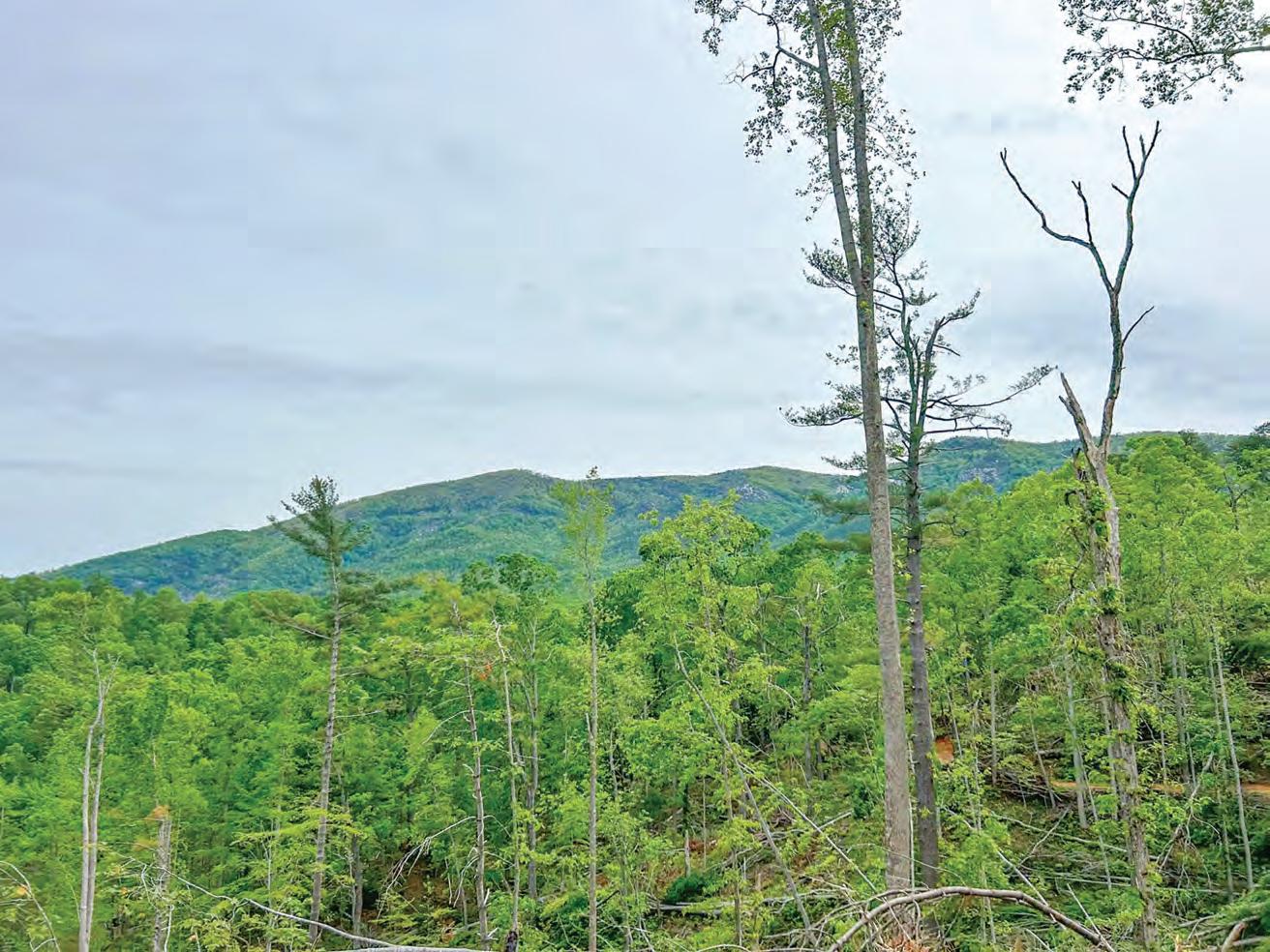
“There are places where salvage logging might make sense, but the hard truth is logging makes wildfires worse, especially the kind of logging that the Forest Service wants to do here, where they are going to leave behind a lot of slash,” Harlan said. “They are going to get the big trees out, and the big trees are the most fire-resistant. But they’re the most commercially valuable, and that’s what the Forest Service is seeking.”
The counterargument, Duncan noted, is that slash also decomposes more quickly, especially in North Carolina’s humid climate, keeping its fire-risk window smaller. Though larger trees are less apt to burn quickly, they pose more risk the longer they dry.
There’s another temporal complication to salvage logging: If a tree falls in a forest and no one is around to salvage it, its value
The scope of the salvage projects may have come to light only because they interrupted another Helene-recovery operation: Early this year, volunteers working to repair a heavily damaged section of the Appalachian Trail near Iron Mountain, a little more than an hour northeast of Asheville, tipped off the SELC that they were ordered to stop work so the Forest Service could prepare the area for logging.
Rondeau did not directly answer a question about whether the Forest Service ordered trail workers to halt recovery. He said it “continues to work closely with the Appalachian Trail Conservancy to plan the removal of downed trees in the vicinity of the Trail.”
The SELC, knowing only that the Forest
ger another period, when dissatisfied parties
will be used — and invite public input.
The press release achieved the first part only in the broadest terms, lumping more than a dozen projects into one, and the second not at all. It didn’t give any information on whether new roads would be built, Scheidt noted, nor whether any endangered species would be affected.
“If we had received this as a scoping notice, we would have challenged it as legally insufficient,” he said. (The SELC has not filed any lawsuit related to the salvage projects, but Scheidt said it continues to monitor them closely.)
Rondeau said the “methods and degree” of scoping efforts vary from project to project and that the salvage projects were “vastly different in scale and complexity.” Asked why the Forest Service didn’t provide scoping details on each project, he noted that some additional details were posted during the advertising period for each project. They were removed from the Forest Service’s web-
Forest Service’s permission to skip much of that process. Alongside documents detailing the 15 projects, it obtained (and later shared with The Watchdog) records showing that Forest Service officials in North Carolina successfully argued the salvage projects met a provision in federal regulations that allows them to speed past environmental reviews when they “must be undertaken to address urgent response or recovery activities.” The agency largely cited fire risk, which it said “pose an urgent public health and safety concern.”
Instead of the detailed environmental statement usually required, according to the document, the Forest Service would instead “take into account the probable environmental consequences of the emergency action and mitigate foreseeable adverse environmental effects to the extent practical.” Kenderick Arney, the regional forester
for the southern region of the Forest Service, signed off on the plan, which also went through Christopher B. French, then the deputy chief of the National Forest System. (French, now the acting associate chief of the Forest Service, issued a memo in April telling forest officials to develop plans to ramp up logging, in accordance with Trump’s orders to do so.)
It’s not clear what those mitigations look like. The Forest Service has not discussed them publicly. It has not responded to The Watchdog’s request for details. In a cache of records obtained by the SELC and shared with The Watchdog, material related to environmental protection — including mitigation plans and spreadsheets showing how the projects could affect endangered species — was heavily redacted. The Forest Service argued that because those documents were created while the project was still in the works, they were “deliberative” and not subject to public disclosure.
Emails reviewed by The Watchdog show that the agency did share some of its mitigation plans with at least one outside party: the Appalachian Trail Conservancy, which it consulted on a handful of projects near the trail. The Conservancy’s spokesperson did not respond to multiple requests for comment by email and phone.
In this void of information, conservationists said they could only speculate about how the projects will affect the forest’s ecology. Josh Kelly, the resilient forests director







for the Asheville-based environmental nonprofit MountainTrue, said he was particular-
Bats love to roost in dead and decaying trees, Harlan said, and should the blow-
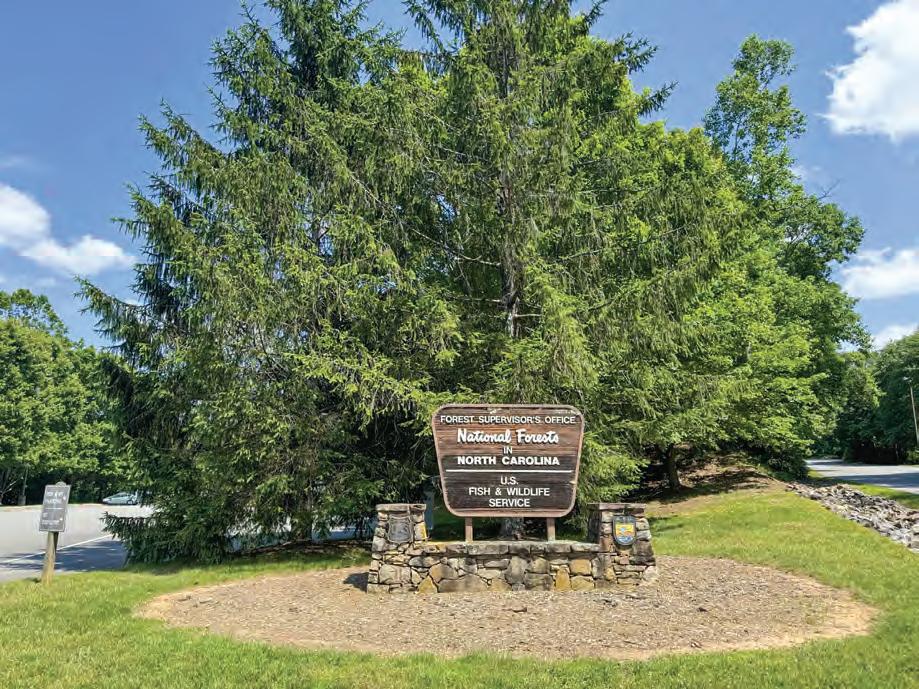
The regional Forest Service division, headquartered in Asheville, got permission to skirt the environmental impact process that typically precedes logging projects. It also received the green light to log in one of the region’s last large roadless areas, where federal policy typically protects ecosystems from industry and development. Watchdog photo by Starr Sariego








Dobson Knob inventoried roadless area. Since 2001, Forest Service policy has protected large swaths of land — some 58.5 million acres nationwide — from logging and roadbuilding. The Dobson Knob area, bisected by the Mountains-to-Sea Trail, is one of the last roadless, wild places in southern
“It’s a spectacular part of the Pisgah,” he said. “To be logging in that corridor, in that viewshed, is heartbreaking and completely
Harlan said he was confused by the plan to log in the remote region in part because it’s the kind of place where natural fire plays an important role in the health of the forest. Foresters have recognized in recent years that decades of policy predicated on fire suppression have allowed for a buildup of fuel that causes more dangerous, destructive
“Fire is essential to our forests,” Harlan said. “Lightning-ignited fires deep in the roadless areas, that’s a place where fire should occur and will occur.”
In March, the SELC — along with Harlan, Kelly and a Sierra Club representative — wrote a letter to the Forest Service, asking it to reconsider logging in roadless areas. It argued that the salvage allowance was breaking the Forest Service’s own rules, including one stating that, on the rare occasions logging takes place in roadless areas, it should only be for small-diameter timber. It asked for more public engagement on the projects and for a meeting to discuss the concerns.











FThis y
, we are making it a night to honor the individuals and faced adversity and chose to rebuild stronger than ever post H Join us as we celebrate not only this year's honorees, but a symbolize for all of Haywood County: the strength, pers and entrepreneurial spirit of a community that stood Enjoy drinks and hors d'oeuvres at 5:00pm while listening to l willbeat6:00pmandwillbehostedbyBen'sBackdraftBBQk

will be at 6:00pm and will be hosted by Bens Backdraft BBQ, known for feeding emergency workers after Hurricane Helene. The awards portion of the evening will follow dinner and conclude at approximately 7:30pm.
Individual tickets are $75 d T Reserve Taables of 6 are available for $500 Sponsorships are available on registration!

James Melonas, the forest supervisor for the National Forests in North Carolina, sent an email response. He did not address questions about the roadless areas but said the agency had been “fully immersed in emergency response efforts” and would soon “reconvene a broad group of interested partners to discuss ongoing recovery efforts.”
On May 28, the Forest Service did host a “partner update” call, Scheidt said, but it included little discussion. In a Microsoft Teams meeting, Forest Service officials made brief comments about post-Helene recovery and showed a PowerPoint presentation. They also locked Teams’ chat function, muted participants and ended the meeting without taking questions.
Already anxious over the expanded logging called for by the Forest Service’s Nantahala-Pisgah Forest Plan, the conservationists said they fear these emergency projects will establish precedents that lead to more opaque operations and more aggressive logging.
Harlan said he worries that roads built in the Dobson Knob area for the salvage project will give the Forest Service access, and an excuse, to stage standard logging projects there in the future. It would fit the direction the Forest Service has taken in loosening protections for old growth forest despite pleas from the public, he said.
“They may be going past the salvage logging and going after intact, mature forest that has no reason to be logged,” he said.
To Kelly, the most alarming aspect of the salvage plan is the shroud of secrecy surrounding it.
“The Forest Service is using the Helene disaster declaration to not do public notification, public outreach, the normal (National Environmental Policy Act) process where they solicit public comment,” he said. “It’s the example of how disaster declarations can be abused, in my opinion. Is this a
harbinger of what’s coming with the Trump administration?”
The lack of public involvement is particularly puzzling, Scheidt said, given that the Forest Service spent many months putting these projects together. Internal emails show officials were starting to plan salvage sales as early as Nov. 7. By Christmas, they had finalized a list of salvage project areas. In a December email to Forest Service colleagues, Brown, the timber contracting officer, acknowledged that the downed trees would remain usable for many months, possibly longer.
draft contracts and Forest Service emails. Internal communications show that the agency was planning to repair roads to make access easier for logging crews. The draft contracts list the base rates for timber at the federal regulatory minimum.
“They’re charging the bargain basement price for this timber,” Scheidt said.
It’s not clear how much salvage logging has already happened in the Pisgah. Asked for an update, Rondeau only offered that the Forest Service hadn’t conducted any additional sales since May 20. But at least one project was underway by May 22, when a post on the Appalachian Trail
“The Forest Service is using the Helene disaster declaration to not do public notification, public outreach, the normal (National Environmental Policy Act) process where they solicit public comment. It’s the example of how disaster declarations can be abused, in my opinion. Is this a harbinger of what’s coming with the Trump administration?”
“We sold timber from (Hurricane) Katrina for a year and a half,” she wrote.
The Forest Service has not issued an update on the salvage projects since May 20, when it posted its update in response to The Watchdog’s inquiries. According to that update, it had sold a half-dozen projects at bid. A seventh project, at Iron Mountain, was sold directly to a buyer after nobody bid on it during the advertising period, and an eighth, at Shope Creek, was sold directly “to minimize mobilization costs.” Two other projects, including Dobson Knob, hadn’t received any bids and had not been sold.
In the absence of completed contracts, Scheidt said, the little that can be gleaned about these projects comes from
Conservancy’s website advised hikers that they’d still have to detour around the Iron Mountain section.
“The storm debris removal project on the closed section of the A.T. at Iron Mountain Gap is ongoing,” the update read. “The heavy equipment being used for the project is extremely dangerous.
(Asheville Watchdog is a nonprofit news team producing stories that matter to Asheville and Buncombe County. Jack Evans is an investigative reporter who previously worked at the Tampa Bay Times. You can reach him via email at jevans@avlwatchdog.org. The Watchdog’s reporting is made possible by donations from the community. To show your support for this vital public service go to avlwatchdog.org/support-our-publication/.




































































































BY B URT KORNEGAY
Iwas walking back into the house when Becky met me at the door, excited: “I think we just had an earthquake! Did you feel it?” She’d heard a low roar, she said, and then a closet door beside her rattled, as if something inside wanted out. “It went on for maybe 20 seconds.” This was on May 10, at 9:04 a.m., to be exact. And all I could say was “What?”
At 9:03, or thereabouts, a wood thrush had flown into a window with a bang, and, picking up a shoebox we keep for such occasions, I’d gone out to where it lay in the grass. Sometimes a stunned bird needs no more than to be placed in a safe, quiet, dark place for a little while to regain its senses. As near as I can figure it, at the same moment Becky heard the roar and rattle, the whole wide world had contracted for me to the wild bird in my hands.
Then a news report confirmed it. The quake had registered 4.1 on the Richter scale. Its epicenter was 40 miles south of Knoxville. It had started 15 miles underground. There’d been no reports of damage. But faster than a speeding bulletin — coinciding, in fact, with Becky’s look and words — the memory of the first earthquake I’d ever experienced came back to me like a 30-year aftershock. There’d been no breaking news, either, to explain it away, because I was deep in the Citico Creek Wilderness in Tennessee.
one of the largest national forest wilderness areas in the east. I was guiding a private school group there on a backpacking trip. We were camped beside a quiet pool in the creek, our fifth morning out. It was July 5, 1995. Breakfast was over, and I was talking quietly with the others about the area’s Cherokee past when there came a roar from
washed over us like a drawn-out wave, filling the valley with sound. Then our camp began to vibrate. I felt my pant legs vibrating too, and the quiet pool beside us was all a-quiver. Its rock basin had been rocked.
I glanced at one of the teachers. “Earthquake!” he said. He’d felt them out west.
In the mid-1970s, when I worked on a carpentry crew in eastern North Carolina reroofing and siding farmhouses, a fellow worker called Big Belly would wave us to one side after lunch, saying, “Boys, git outen the way ‘twixt me and them bushes, cause my bowels they are a-rumblin!” He had to sign his paychecks with an X, but he had earthy
firma,” the Mother Earth you’ve known all your life, and then in an instant to find an infirm mother underfoot! “Earth shaking” is from the ground up. We’d been planning to make Indian gourd rattles that morning to shake around the final night’s campfire festivities when a resounding blow from deep below turned the valley into a reverberating drum.
Then the tremors began to subside. Or rather, they followed the departing roarwave down Citico Creek. Water and air and camp and my pant legs eased back to reassuring sight, sound and feel.

Citico Creek Wilderness borders our Joyce Kilmer-Slickrock Wilderness in the Unicoi Mountains, on the Tennessee side of the state line, and together they make up
coming?” — which was nonsensical since there’d been no rain.
The sound had the deep quality of thunder but none of thunder’s toss and tumble. Instead, a sustained and increasing roar came rushing down the creek toward us. It


the yard he’d go. Now, deep down at our campsite beside Citico Creek, surrounded by mountains amplifying the sound, Earth’s belly rumbled, but there was nowhere for us to “git.”
What a jolt it is to be standing on “terra
Then came the logical questions. Had we been close to the epicenter of a mild earthquake? Or were we on the periphery of a magnitude 7 or more? Was Atlanta or Asheville or Knoxville tumbling down? Or even — it suddenly occurred to me — Cullowhee? Anxiety swept over me with that thought. I imagined Becky and Henry lying in the rubble of our collapsed house. I had to tamp down the urge to claw my way out of the woods to find someone, anyone who could assure me that my fears were but a heartquake.
We decided that if the earthquake had been destructive, we’d see aircraft passing overhead. But the sky stayed quiet and blue.
When I returned home from the Citico Creek trip, Becky gave me an article she’d saved from the July 6 issue of the Asheville Citizen Times, 1995: “Earthquake shakes southwestern N.C.” It had registered 3.7. And based on a red bull’s-eye that showed the epicenter on a map, our camp had been centered right on top of it.
“So, that’s what 3.7 feels like,” I was thinking as I read, when the shoebox rattled me back to May 10, 2025. I was sanding in the house with Becky and a wood thrush that wanted out.
(Burt and Becky Kornegay live in Jackson County. “Up Moses Creek” comes out the second week of each month.)


The N.C. Wildlife Resources Commission (NCWRC) is providing guidance to livestock owners on methods to protect their animals from becoming prey to black bears.
Black bears tend to consume a mostly plantbased diet and are attracted to livestock feed, such as grains and corn. However, they are omnivores and opportunists and will feed on eggs, small livestock (such as chickens and rabbits) and larger animals (including goats, miniature ponies and alpacas). Raising livestock of any species in bear country requires BearWise husbandry practices, even for small-scale, backyard operations.
Just three chickens total about 4,500 calories — almost two days’ worth of nutrition for a bear. A dozen eggs is 900 calories.
To keep bears from accessing livestock and livestock feed as a food source, it is important to properly secure attractants.
“Bears are quick learners and highly food motivated. Once they discover an easy food source, like a chicken coop, they will come back and visit others,” says NCWRC Black Bear Biologist Jenna Malzhan. “This can be heartbreaking and costly for people and puts bears at risk of harm by food-conditioning bears to humans and livestock.”
BearWise is an Association of Fish & Wildlife Agencies program dedicated to helping people live responsibly with bears. It offers information and instruction on protecting chickens and helpful information for livestock owners and beekeepers. Proper husbandry practices are key to coexistence, and BearWise recommends the following proactive measures:
• Always store livestock feed and pet food away from the animals in a locked, bear-resistant shed or building, or in a bear-resistant container.
• Place livestock pens and bee hives at least 50 yards away from wooded areas and other cover that could protect bears from view. Confine livestock in buildings and pens, especially during lambing or calving seasons.

Traditional measures may not be enough to protect poultry from bears. Donated photo
• Consider bringing livestock, particularly smaller animals, inside at night.
• Remove carcasses from the site and dispose of them by rendering or deep burial.
• Install electric fencing or own a guard animal.
Standard chicken and rabbit coop designs aren’t strong enough to keep out a determined bear. Some bears are so fond of larval bees and honey they will seek out hives in their home range. BearWise recommends harvesting honey as soon as possible to reduce the appeal of apiaries (bee hives). Electric fencing works best to keep out bears and prevents damage to hives, coops and goat or rabbit structures.
To learn more about safely raising livestock in bear country, please visit bearwise.org and contact NCWRC’s Wildlife Helpline for assistance at 866.318.2401, Monday-Friday, from 8 a.m. to 5 p.m.
Great Smoky Mountains National Park will offer the first Cades Cove vehicle-free day of the year on June 18. Vehicle-free days provide opportunities for pedestrians and cyclists to experience the 11mile Cades Cove Loop Road without motor vehicles.
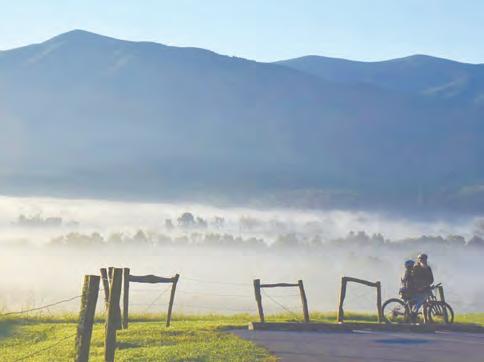
Smokies Life is thrilled to announce its first audiobook, a narrated adaptation of the 2021 release for middle-grade readers, “A Search for Safe Passage,” about an intrepid group of animals trying to find their way across a dangerous highway.
Written by Frances Figart and illustrated by Emma Oxford, “A Search for Safe Passage” tells the story of best friends Bear and Deer, who grew up together on the north side of a beautiful Appalachian gorge. In the time of their grandparents, animals could travel freely on either side of a fast-flowing river, but now the dangerous Human Highway divides their home range into the north and south sides. On the night of a full moon, two strangers arrive from the south with news that will lead to tough decisions, a life-changing adventure and new friends joining in a search for safe passage.
The 110-page softcover book is now brought to life by the narrating talents of Rose Houk, an Arizona-based writer and editor, who has authored several books published by Smokies Life. Houk’s audio work includes the series “Earth Notes,” which she produces for Arizona Public Radio. Her masterful narration engages listeners in the actions and emotions of distinctive characters throughout the two-hour audiobook.

‘A Search for Safe Passage’ will be Smokies Life’s first audiobook. Donated photo
Listeners have access to a digital, illustrated companion booklet, as well as bonus downloadable sheet music for “Safe Passage: Animals Need a Hand,” a song written by the author and featured in the audiobook, performed by Asheville-based trio The Fates along with percussionist River Guerguerian.
The audiobook is available on Audible, Apple Books, Barnes & Noble, Kobo and Spotify. Prices vary. Also, check the public library lending app Libby. Find more information at smokieslife.org/a-search-for-safe-passage.

Vehicle-free days will continue every Wednesday through Sept. 24. Reminders for vehicle-free day:
• Safety first: Always wear a helmet when cycling and adhere to the posted speed limit of 20 miles per hour.
• Park smart: Vehicle-free days are popular, and parking is limited. Please park only in designated spots to keep roads safer and to protect roadside ecosystems. Don’t forget to grab your parking tag before heading out.
• Timing is everything: Arriving in the afternoon could give you a much more relaxed experience. If there is no parking available, you will be asked to return later in the day.
• Pack wisely: Due to the terrain of the Cades Cove Loop Road, it often takes people longer than they expect to bike or hike the road. Bring essentials like food, water and a first aid kit to be prepared. Remember, there is no cell service here, so plan accordingly.
• Know the rules: Only non-motorized bicycles, as well as Class 1 and Class 2 E-bikes, are permitted (Class 3 E-bikes are prohibited). All other motorized and non-motorized vehicles, such as scooters, skateboards and hoverboards, are not allowed.

The Smoky Mountain News Marketplace has a distribution of 16,000 copies across 500 locations in Haywood, Jackson, Macon and Swain counties, including the Qualla Boundary and west Buncombe County. Visit www.wncmarketplace.com to place your ad!
Rates:
• $15 — Classified ads that are 25 words, 25¢ per word after.
• Free — Lost or found pet ads.
• $6 — Residential yard sale ads.*
• $1 — Yard Sale Rain Insurance Yard sale rained out? Call us by 10a.m. Monday for your ad to run again FREE
• $375 — Statewide classifieds run in 170 participating newspapers with 1.1+ million circulation. (Limit 25 words or less)
• Boost Online — Have your ad featured at top of category online $4
• Boost in Print
• Add Photo $6
• Bold ad $2
• Yellow, Green, Pink or Blue Highlight $4
• Border $4
Note: Highlighted ads automatically generate a border so if you’re placing an ad online and select a highlight color, the “add border” feature will not be available on the screen.
Note: Yard sale ads require an address. This location will be displayed on a map on www.wncmarketplace.com
p: 828.452.4251 · f:828.452.3585 classads@smokymountainnews.com www.wncmarketplace.com
NOTICE OF ADMINISTRATION
Case No.25E000369430
Mary Elizabeth Foun-
Patricia Ann Fricks County, North Carolina, Sep 11 2025, or Administrator 884 Crawford Rd Waynesville, NC 28785
NOTICE OF ADMINISTRATION
Case No.25E000164-490
Leah McKoy County, North Carolina, Aug 21 2025, or
Co-Administrators
705 W Main Street Sylva, NC 28779
NOTICE OF ADMINISTRATION
Case No.25E000368-430
Administrator
67 Foliage Lane Canton, NC 28716
NOTICE OF ADMINISTRATION
Case No.25E000318-430
Samuel Clifford Russell North Carolina, this is to Aug 21 2025, or this
David Lewis Williams, II County, North Carolina, Sep 11 2025, or
Executor
134 Barn Loop Lane Waynesville, NC 28786
NOTICE OF ADMINISTRATION
Case No.25E000197-490

Noel Ray Dillard County, North Carolina, Sep 11 2025, or
Executor
705 W Main Street Sylva, NC 28779
NOTICE OF ADMINISTRATION Case No.25-E-50
Jean Privette Monteithty, South Carolina, this Aug 28 2025, or
Wayne Dean Monteith, Ancillary Executor
NC 28052
Specializing in solving love problems! Spartanburg, SC. Daily 8am-10pm. Call for appointment. (864) 576-9397








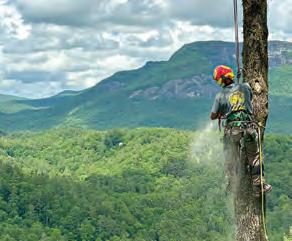





























5 Doubtfire's
35
"The King --" 66 Weed -- (lawn product)
Inca's home 75 Basil, for one
"Band on the Run"
Speaks
83 Kin of reggae 84 Mimic
85 Three trios
87 To be, to Henriette 88 More apt to complain 89 "Check," at a poker table
90 Dam creation
-- Tar Pits
92 Like some huts or hats 93 Penitent sort
Safari shelter
99 Michael of R.E.M.
100 Singer such as Pavarotti
101 "Shucks!"
102 "Yes, --!" ("Indeedy!")
103 Vietnam's capital 104 Bury
106 Latvia's capital
107 Paris hub
108 Actress -- Pinkett Smith
110 Barbers cut it 111 Ugly beast
114 Sow or cow
ANSWERS ON PAGE 34



Here’s How It Works: Sudoku puzzles are formatted as a 9x9 grid, broken down into nine 3x3 boxes. To solve a sudoku, the numbers 1 through 9 must fill each row, column and box. Each number can appear only once in each row, column and box. You can figure out the order in which the numbers will appear by using the numeric clues already provided in the boxes. The more numbers you name, the easier it gets to solve the puzzle!

ESTIMATE, call 24/7: 1-833-880-7762
call 24/7: 1-833-880-7762
BEAUTIFUL BATH UPDATES in as little as
BATH & SHOWER UPDATES in as little as ELIMINATE GUTTER CLEANING FOREVER!
BATH & SHOWER UPDATES in as little as
STEP. NORTH AMERICA’S #1 North
BEAUTIFUL BATH UPDATES in as little as ONE
GUTTER CLEANING FOREVER!


































































































































































